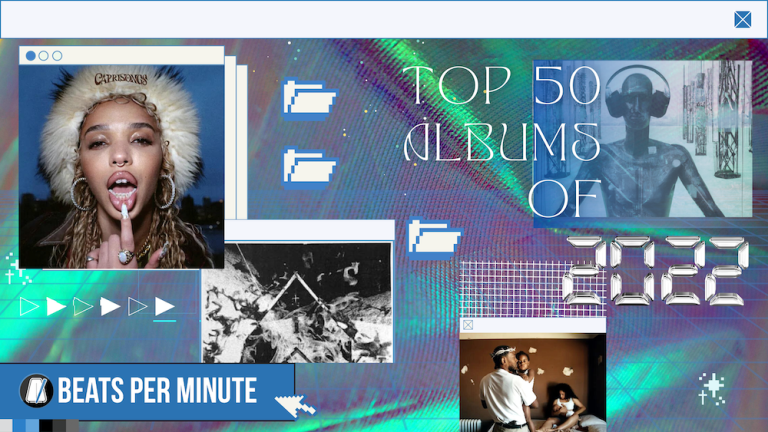You could easily write a dramatic pop-rock opera about the major global events that happened in 2022. From war in Ukraine, to the US Supreme Court’s overturning of abortion rights, to the UK’s shortest-standing Prime Minister, to unjust murders in Iran, to an extremely divisive election in Brazil, to a winter World Cup in Qatar and so many other things beyond, there is no shortage of material.
Fortunately (or unfortunately), none of the artists in our Top 50 Albums of 2022 have attempted such a project (at least not yet), but all of them will forever stand as vivid reminders of this tumultuous year. Through each of these global events and catastrophes, these records have been the soundtrack. Beyond that, when it comes down to major milestones in our own personal lives, these records have become woven into the very fabric of the memories.
Each of these albums is truly special and will forever stand as beacons of hope and sources of comfort that stood above the quagmire of 2022. We’ve collected them here and done our best to explain how they managed to transcend everything else, cutting through the noise and providing positivity and solace through it all. We hope you enjoy.
Listen to a Spotify playlist of our highlights from our Top 50 Albums of 2022 here.

50.
TENGGER – Earthing
[Self-released]
We all experienced some form of separation from loved ones during the pandemic, but the division of TENGGER between Japan and Korea sounds particularly tough. Not only are itta and Marqido musical partners, but they are a married couple with a young son. Separated for well over a year, the importance of their musical project took on new dimensions in maintaining their metaphysical, mental and creative connection.
Rather than focus on the distance between them, TENGGER’s Earthing is a celebration of the natural world in which they are both ensconced and a plea for humanity to rekindle its connection to the planet. They incorporate more field recordings than ever, while Marqido’s impressionistic but simple synth playing carves out aural landscapes that flutter and overwhelm with their simple majesty. itta’s vocals, when they appear, are whisper soft, representing the caressing curlicues of the breeze. As you listen, you feel as if you are breathing in the freshest air from the most verdant of settings. TENGGER may have been separate, but with Earthing they created their own audio world in which they could meet and give thanks for life itself. – Rob Hakimian
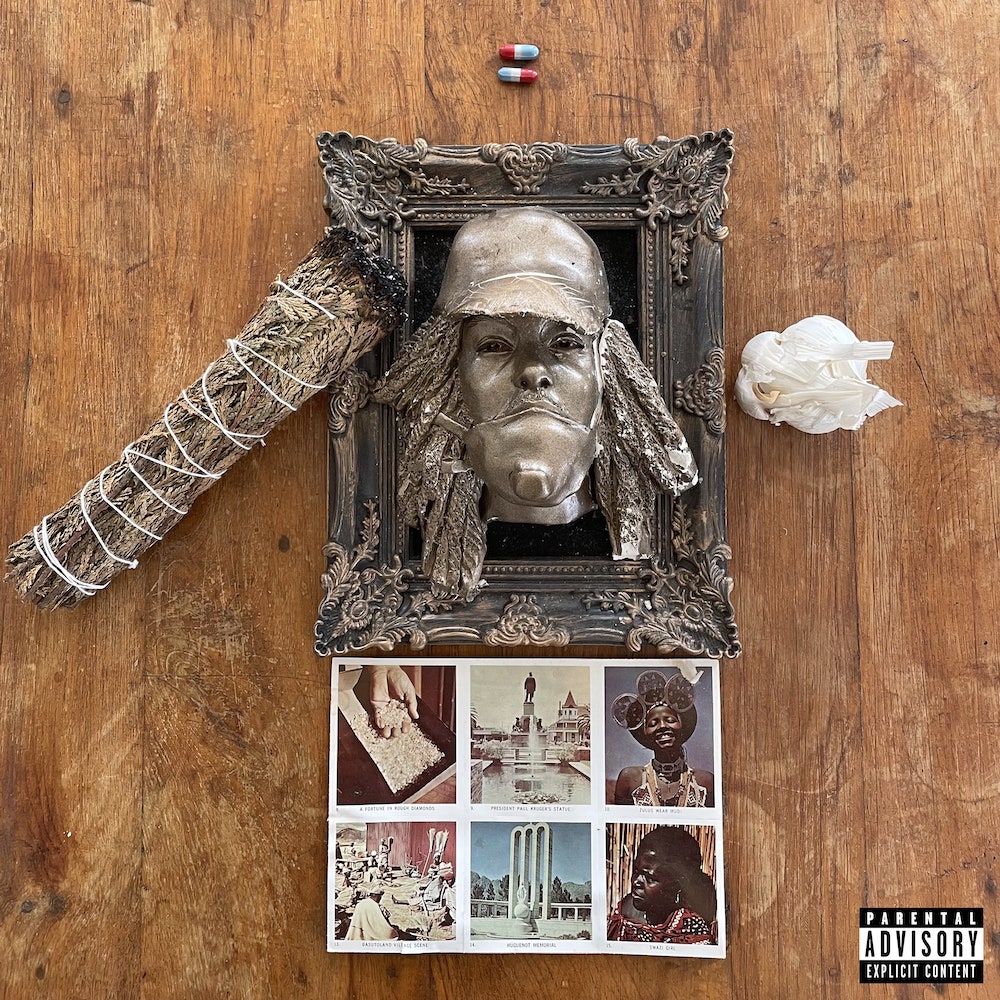
49.
Earl Sweatshirt – SICK!
[Tan Cressida]
SICK! ruminates not just on COVID-19, but a stew of societal breakdowns, intoxicants, mortality, depression, pressure, and the unanticipated intrusion of empathy. Though still flowing with a spoken-word stream of consciousness, Earl Sweatshirt has been shocked into focus just as he has started to feel comfortable. Evasive measures like getting high and drinking only land Sweatshirt closer to the mirror, where he can’t help feel affected by the suffering of others, humbled before his maker, and enraged by rent hikes. SICK! is an inner monologue for all of us not just trying to find peace of mind but wondering whether we deserve it. – Steve Forstneger
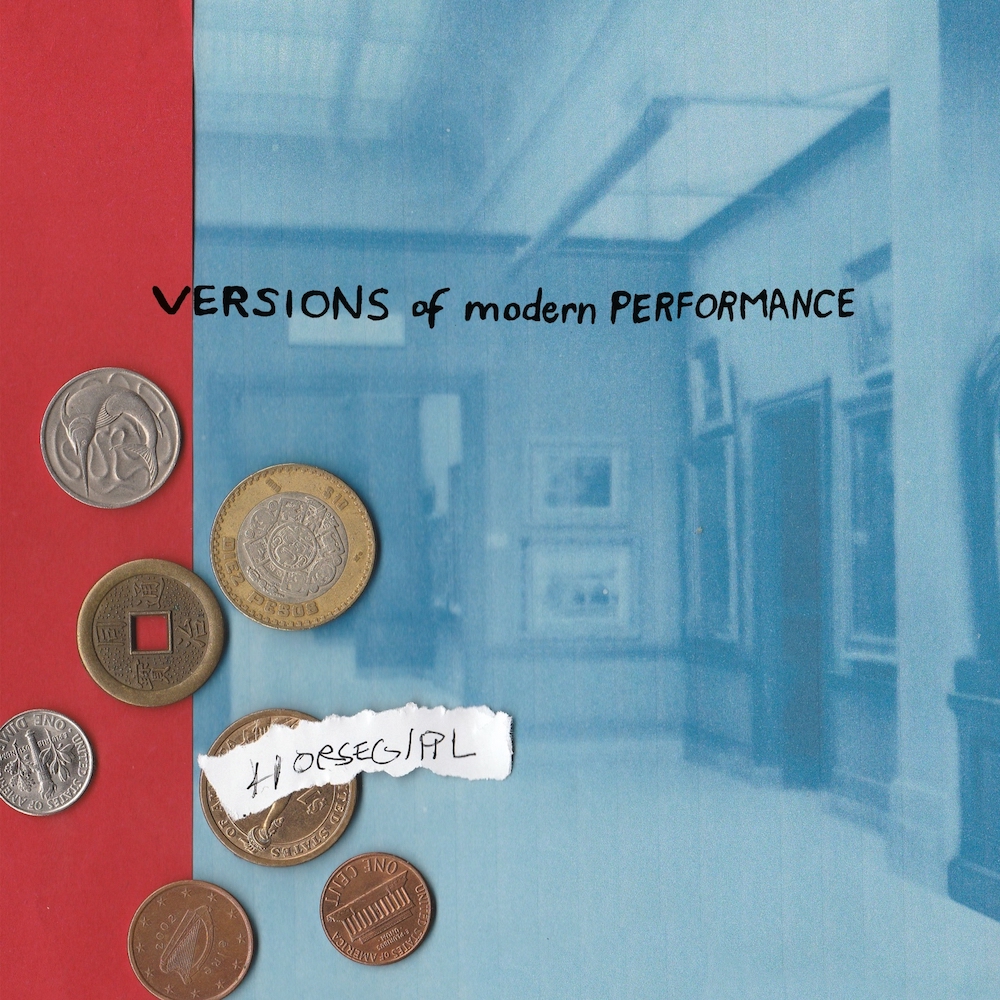
48.
Horsegirl – Versions of Modern Performance
[Matador]
The first time I heard Versions of Modern Performance I was reminded of my first encounters with the music of Pavement and Sonic Youth, two bands who epitomize the origins of my induction into indie rock canon. The familiarity was strong, but with each listen, I heard more and more about the band themselves and less about their overt influences.
This album is more about how Horsegirl internalized their antecedents rather than how they co-opted these sounds for their own design. Echoes of post-punk, shoegaze, and even some lighter moments carrying a faint hint of twee flooded through these songs, a broad and joyous canvas of noise that directs us to the past but also to their inimitable talent in processing and reshaping their own inspirations. The band knew that they had to show the connections between these genres without relying on the goodwill of the artists which shaped them, and through a kind of bespoke nostalgia, they created an orchestra of intimate memory and rhythmic recollection. – Joshua Pickard

47.
Grace Cummings – Storm Queen
[ATO]
Grace Cummings has a voice that seems completely incongruous to the youthful figure she cuts through life; it’s guttural and rich, the kind that should take years – if not decades – to grow into. What’s more, she has the gravitas to go with it, and she uses this instrument to relay a world-weariness that is equally beyond her experience. Her wistful rememberances and fired-up missives are not borne out of romantic love and heartbreak, but of love of nature and the horror of the destruction she sees firsthand in her native Australia. Pairing her voice and her words together, Storm Queen is a wake up call sent around the world, causing us to bolt up and pay attention to this undeniable talent and – more importantly – the important message she relays. – Rob Hakimian

46.
Cate Le Bon – Pompeii
[Mexican Summer]
Cate Le Bon’s albums are tactile, crafted in such a way as to evoke texture and rhythmic contours. You can practically feel the ridges and shallow cutouts as each song spins in its orbit. Pompeii feels like the album she’s been trying to make for years, and it further refines her methods for creating music that, in its own way, attempts to engage more than one sense at a time.
Packed with synths, saxophone, and various other horns, the record is a virtuosic marvel of tactual experiences, an elaborate lyrical missive on how we confront and engage with reality and the lingering connections that bind us all together. More experimental and dismantled in its structures than earlier efforts, it follows her as she attempts to balance our uncertainty of the future with an innate curiosity that lingers on the periphery of our awareness. What comes across so well is how Le Bon humanizes this endeavor, in how she forces us to reconcile our own impulses with our understanding of human nature. Pompeii will take you down some unexpectedly craggy trails, leaving you exhausted, breathless, and anxious to hear just a little bit more. – Joshua Pickard

45.
Empath – Visitor
[Fat Possum]
Empath’s first album Active Listening: Night on Earth is the noise-pop equivalent of riding a cranked up Tilt-A-Whirl under the influence of acid and cotton candy. On their excellent follow-up, Visitor, they managed to conduct their rambunctious noise explosions into actual songs. Listen to “Passing Stranger” and you could envision them making a similar splash as, for example, The Flaming Lips: a bunch of ruckus-making outcasts gradually morphing themselves into indie rock heavyweights. On Visitor, Empath are still at their most fun when embracing the usual free-spirited chaos, without leashing themselves to traditional pop totems. The way “Diamond Eyelids” accelerates into its wordless chorus using aural cartoon physics akin to Deerhoof, it never fails to draw a cheer. – Jasper Willems
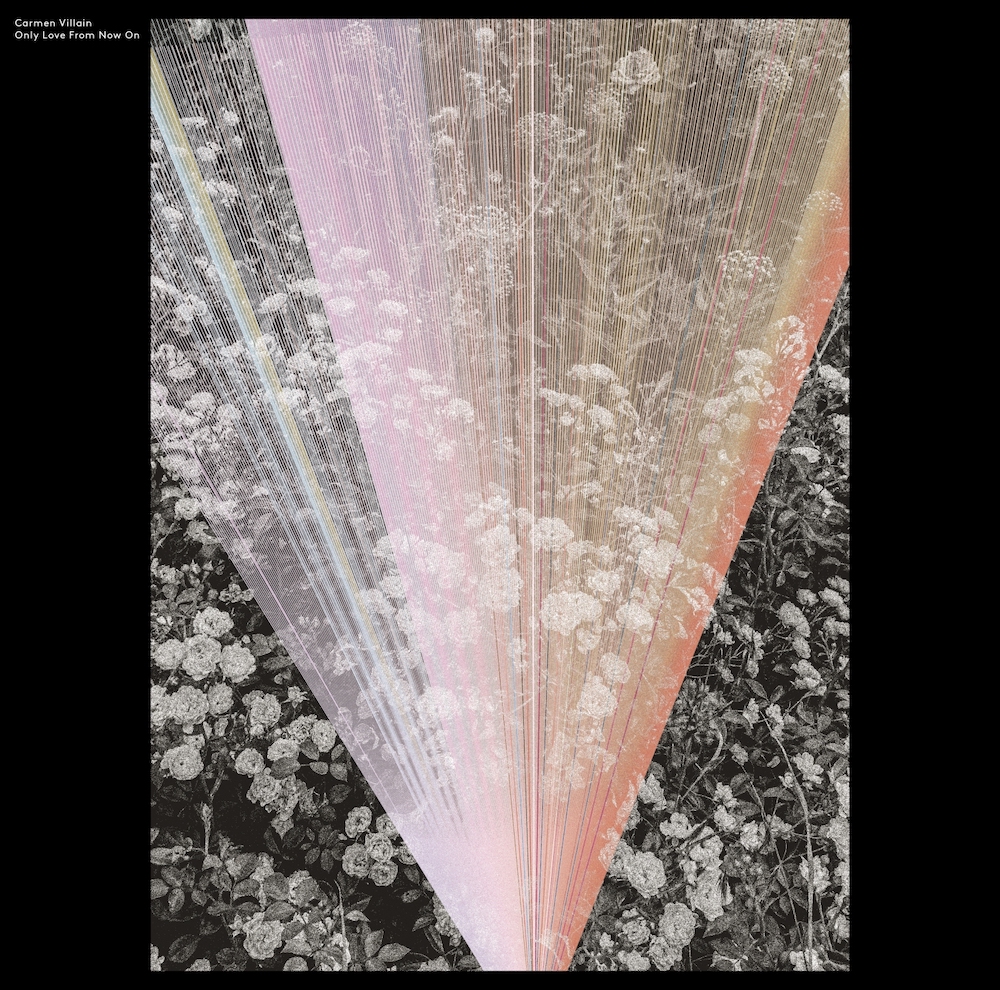
44.
Carmen Villain – Only Love From Now On
[Smalltown Supersound]
In a recent interview, Carmen Villain insisted that she refuses total control over her music, favoring spontaneity; yet the spell she casts with Only Love From Now On (as well as the title) suggests anything but. A quilt of organic, digital, and found sounds, most of the album feels coaxed out and captured: flowers lured into blooming, rocks beckoned to tumble, and light an unwitting instrument. Musique concrète one moment and uprooted house synths the next, Only Love often feels like a mischievous, self-animated Mad Libs pad, daring you to mentally fill in the blanks before doing so on its own with something unexpected and mildly absurd. Despite its patent modernity, it cozily recalls Tangerine Dream, Vangelis, Matmos and the spectroscopicnaturism of oh, the joy. – Steve Forstneger
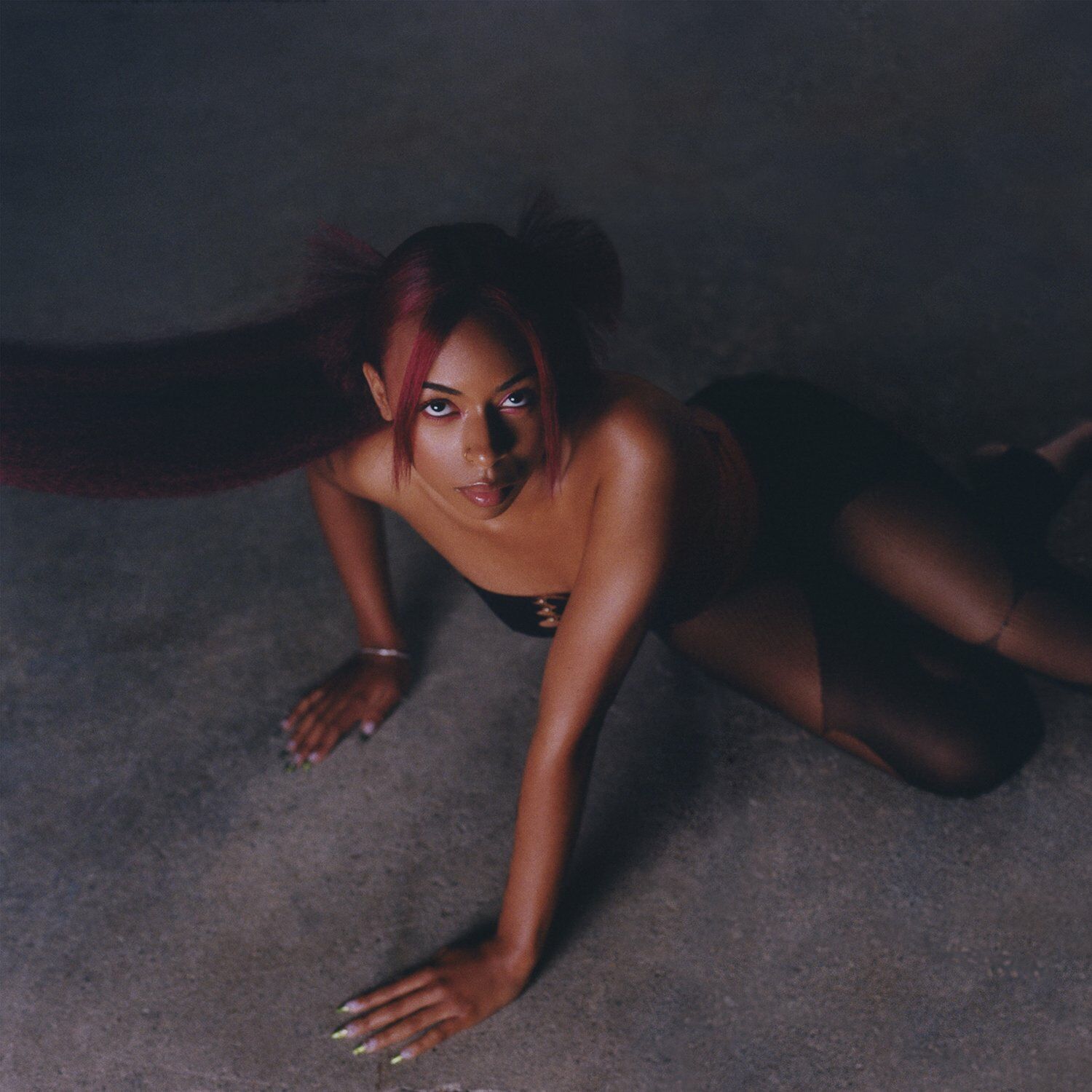
43.
Ravyn Lenae – HYPNOS
[Atlantic]
Even as standout project after standout project is released by female artists who are dominating the resurgence of R&B, singer-songwriter Ravyn Lenae’s debut album HYPNOS is a unique jewel in the crown. Sumptuous, ethereal and alluring, Lenae’s agile, fluttery vocals are in perfect counterpart to the dreamy production landscape of this 16-track epic. With magical combinations of neo soul, electronic, funk and the occasional orchestral flourish, Lenae’s naming of this album feels apt as it transfixes the listener into a lull of respite and recovery.
The lyrical themes vary: her introspective search for self-worth in the fight against insecurity (“Inside Out”); the caution in forming casual connections (“3D”); or, revelling in the freedom of individuality and letting go of baggage (“Deep In The World”). Even at its most assertive and “aggressive” such as on the futuristic, blipping “Venom” – Lenae doesn’t bare her teeth but approaches calling out someone for their bullshit in an amused way (“Why do you play me for a fool?” she reproaches with a raised eyebrow.)
Lenae’s debut is a cohesive, near-perfect collection of melodic earworms that soothe the soul. Let HYPNOS be proof that Lenae is one of R&B’s most exciting ingenues. – JT Early

42.
Duster – Together
[Numero Group]
With their latest album, Together, Duster forge their most stylistically cogent sequence to date. “Retrograde” contrasts smooth and serrated sounds, built around a steady and pulsating beat. The vocal is plaintive, narcotized, muted yet volatile. On “Familiar Fields,” the band inch toward postpunk motifs, a wiry guitar riff undergirded by a snare-heavy drum part. Noise sprawls are employed cautiously, texturing the track but never stealing center stage. A whispered vocal on “Sleepyhead” is alternately buoyed and battered by an alternately strummed and riffy guitar part. Closer “Sad Boys” shows the band sinking into an uber-slowcore progression that recalls Codeine or Low’s best work, a jazzy drum sequence undergirding a quasi-melodic instrumental sprawl. The vocal bobs on the sonic surface, serving as a metaphor for resilience as well as the inevitability of oblivion.
Over the course of 13 tracks and 47 minutes, Together invokes a melancholic yet oddly ecstatic trance. By surrendering to repetitive rhythms and mantric vocal intonations, the listener travels through grief toward a spiritual catharsis. – John Amen
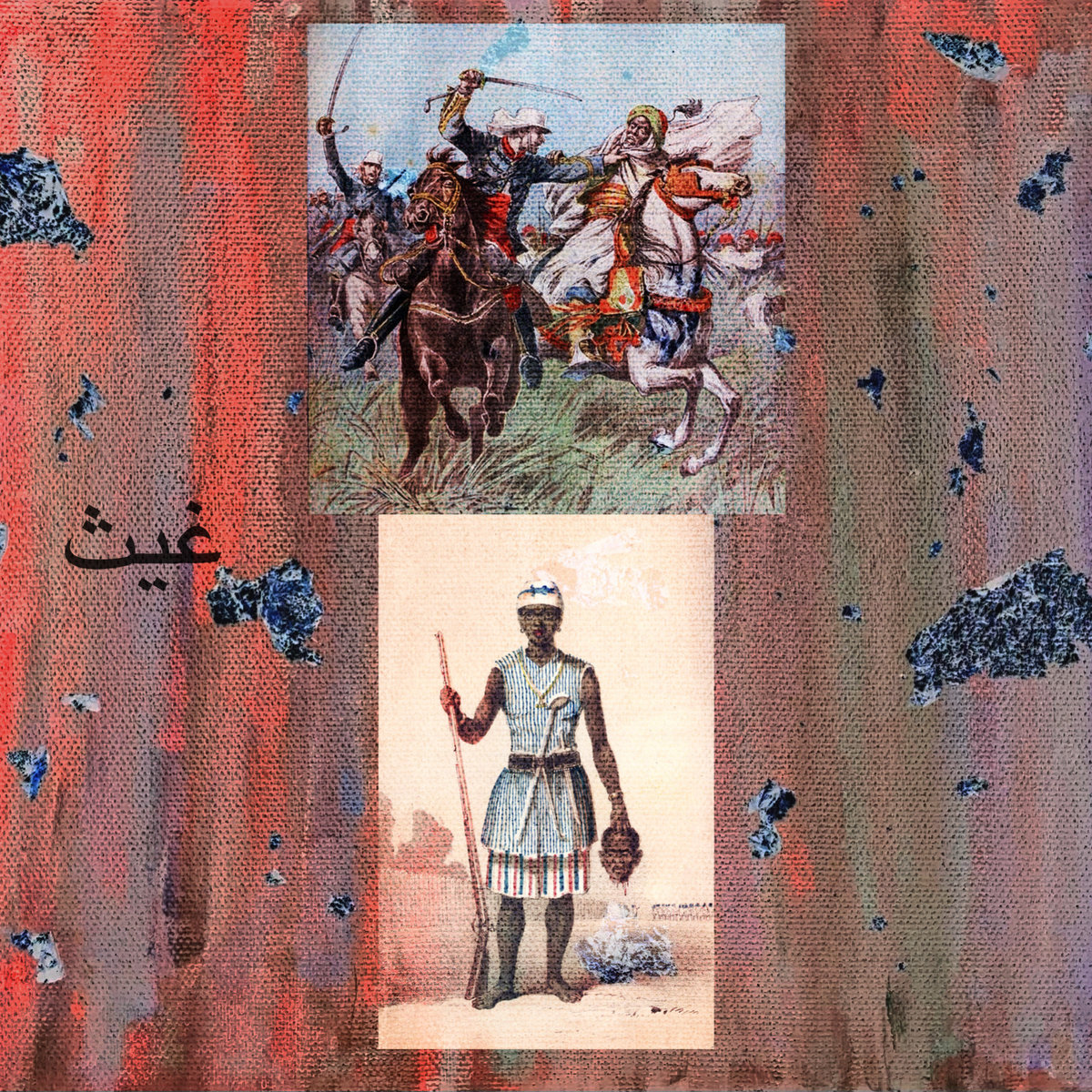
41.
Ghais Guevara – There Will Be No Super-Slave
[Self-released]
There Will Be No Super-Slave is a difficult album to tackle. It can appear inscrutable, unapproachable in its sheer complexity, especially for a white listener who hasn’t experienced the generational (and current) pain that Black people live with on a day to day basis, but at its core is a deconstruction of that very ailing. Employing a wide range of samples and always centered on Ghais Guevara‘s potent delivery and lyricism, attacking apathy from every angle, questioning everything while occasionally providing painful answers. It tackles prejudices and cruelty with a vicious intent, all while letting hope linger just in the shadows. An album as difficult to piece together as it is essential. – Chase McMullen
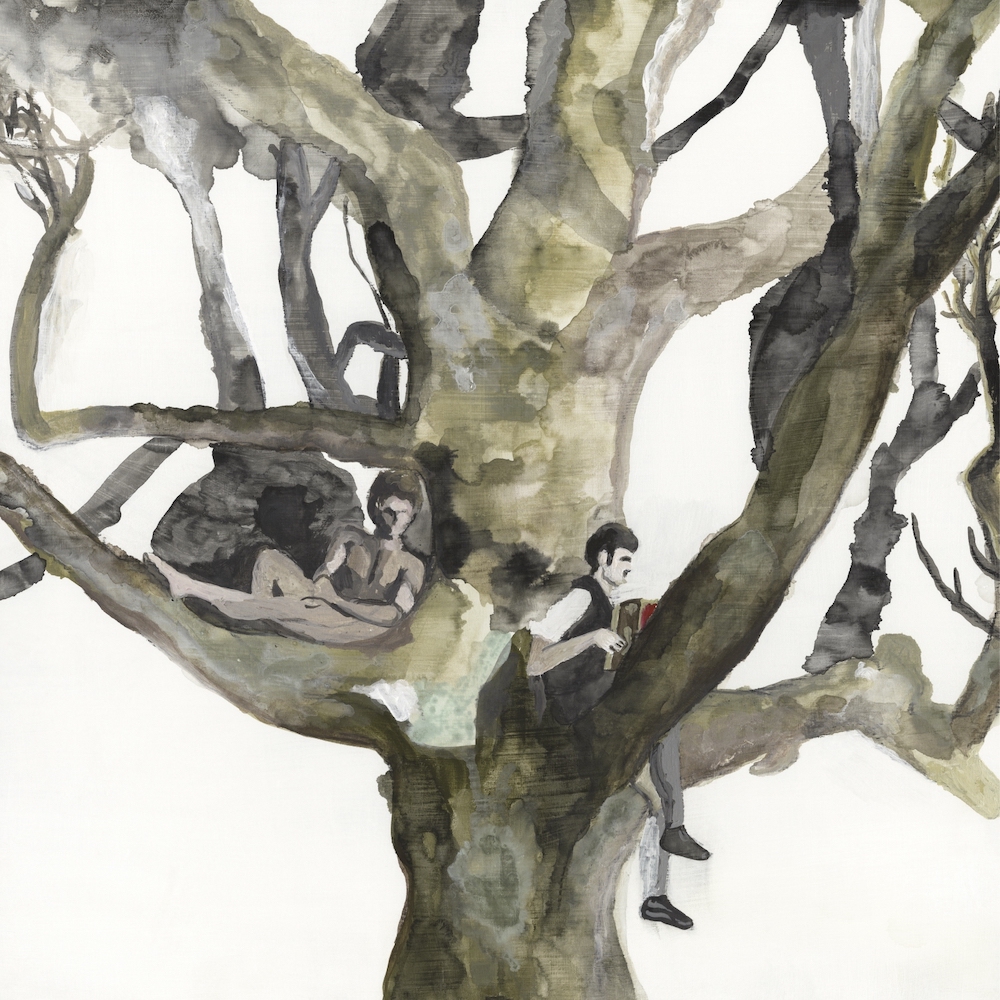
40.
Destroyer – Labyrinthitis
[Merge/Bella Union]
One may not ever know quite what to expect from a Destroyer album, but lately, one can at least expect a smooth sound and a weird time. Ever since 2011’s landmark Kaputt, Dan Bejar and co. have been enmeshed in a world of slick synths, sensual horns, groovy bass, and ever-more evocative lyricism and melodies. Obtuse could be an alternate word, too.
But on this year’s Labyrinthitis, Bejar gives us his best crop of songs in some time, whirling through a blend of psych pop, weirdo folk, and haunted jazz. The brittle beats mix with the outward-gazing instrumentation, while Bejar lays down some of his most indelible songs, like the surly, rambling, and joyously incoherent “June”, or the almost clubby “Eat the Wine, Drink the Bread”. And alongside the more brash and bright moments are tunes like “All the Pretty Horses”, with its spacious and languid melodies, or the luxuriously somnolent instrumental title track. Bejar has cooked up one of his more succinct records with Labyrinthitis, but it’s also one of his most playful and catchy, a showcase for what he does like no other. – Jeremy J. Fisette
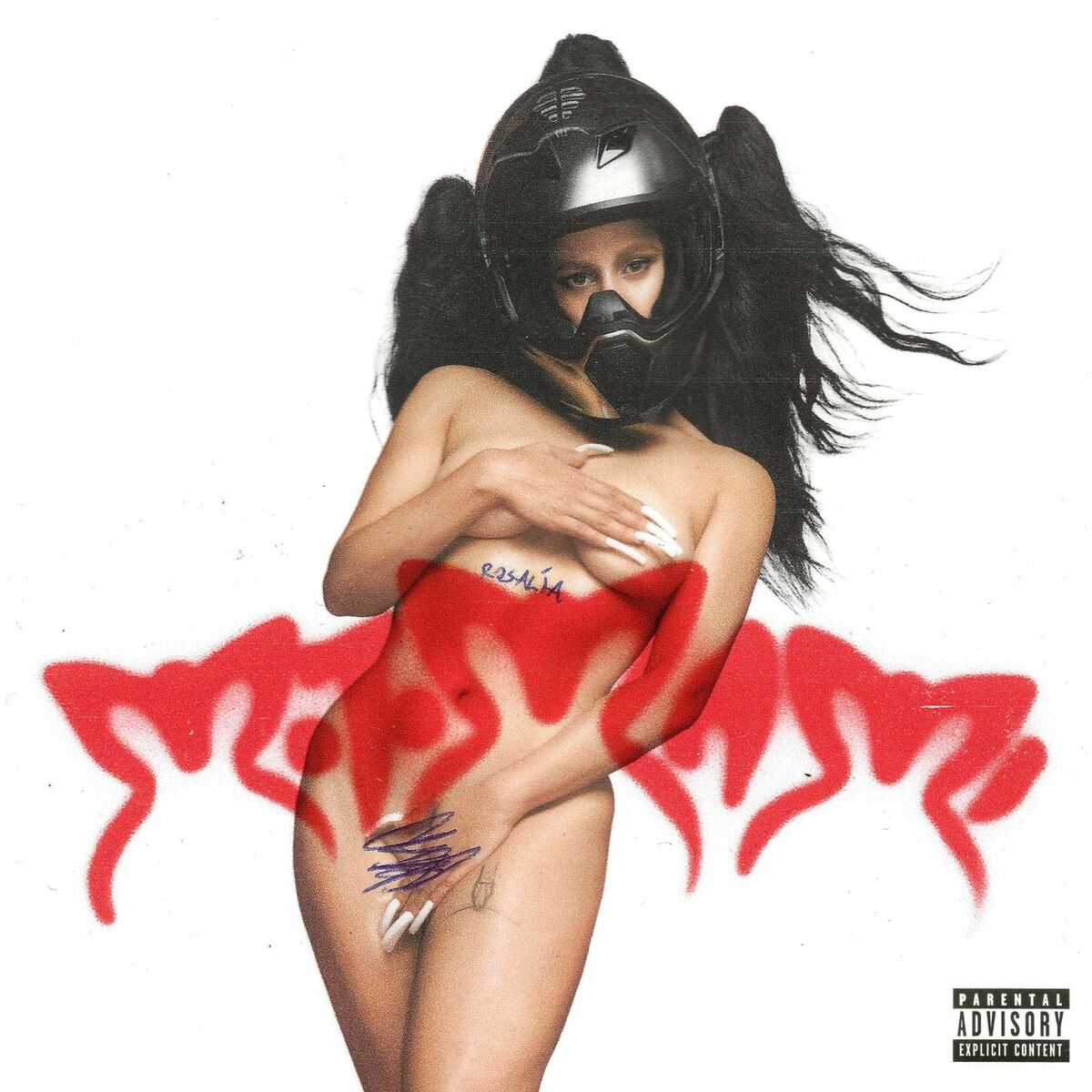
39.
Rosalía – MOTOMAMI
[Columbia]
With a debut album of traditional flamenco, a breakout concept album of experimental pop that took the world by storm with its blend of modernity and Spanish and Latin traditions, and several energetic and inventive stand-alone singles since, Rosalía gave very few clues as to what she would do for her third record. When MOTOMAMI arrived the answer was the best possible: Whatever she wanted.
She is almost everything imaginable in this album. She’s a pop star and a classically trained flamenco artist. An immensely talented vocalist and an avid user of autotune. A maker of radio-friendly hits and an avant-garde experimentalist. Whether she is doing dembow, flamenco, or a ballad, Rosalía never disappoints. MOTOMAMI is the kind of brilliant work that expands the horizons of the music taste of those that listen to it, and also the home of a ballad called “HENTAI”. It’s hard not to fall in love with Rosalía’s way of making even the most forward-thinking music extremely fun, and MOTOMAMI puts that skill in full display. – Lucas Martins

38.
billy woods – Church
[Backwoodz Studioz]
Unlike billy woods‘ other sensational album this year, Aethiopes, here on Church every song is provided with a beat and a grounding backbone from producer Messiah Musik. It’s fitting that it also finds woods reeling in his raps to a more personal, first-person perspective. Still, wandering through his shrouded mental landscape is like hacking your way through a jungle; it’s sweaty, dense and the potential for something deadly lurks in every shadow.
Although, if it’s any jungle it’s the concrete one; woods’ life since moving from Zimbabwe (some of which we learn about here) has been rooted in the streets of NYC, and every facet of life that ekes from the cracks is of fascination to him. Following his train of thought is treacherous, almost impossible, but endlessly compelling. He makes jumps in vision and logic through secret passageways that only he sees, but whether juxtaposing images of Mormons and strip clubs on “Schism” or approaching religion from a more sobering point of view on “Fuschia & Green”, woods is always in firm grasp of his subject matter. – Rob Hakimian

37.
Hikaru Utada – BADモード
[Sony]
Having more or less conquered J-pop by the end of the 2000s, Hikaru Utada has continued to forge their own path through the mainstream music landscape, becoming a role model for everyone. Simultaneously balancing motherhood with a continued dedication to musical output, fearlessly expanding on pop traditions while also crossing lines uncommon for Asian stars – including coming out as non-binary – Utada has wisdom and confidence that is as awe-inspiring as it is joyous.
Their latest album BADモード is a culmination of the artist’s growing comfort with themselves. They prove themselves adept at working with some of the west’s most in-demand and boundary-pushing producers, skimming over minimal production from A.G. Cook on “君に夢中”, slipping effortlessly into Floating Points’ groove on a trio of tracks and even conquering the mania that is the Skrillex-produced “Face My Fears”.
Even more impressive than this is Utada’s range of emotions; far from the joy/melancholy dichotomy that dominates a lot of mainstream pop, we get the full spectrum of a parent approaching their 40th birthday. They touch on self-discovery, sexual desire, and – as the album’s title suggests – downright moodiness and depression, giving their whole body, mind and voice to each different tone. It presents a whole, rounded picture of an artist who may have reached the top of the game some time ago, but will never be satisfied. – Rob Hakimian
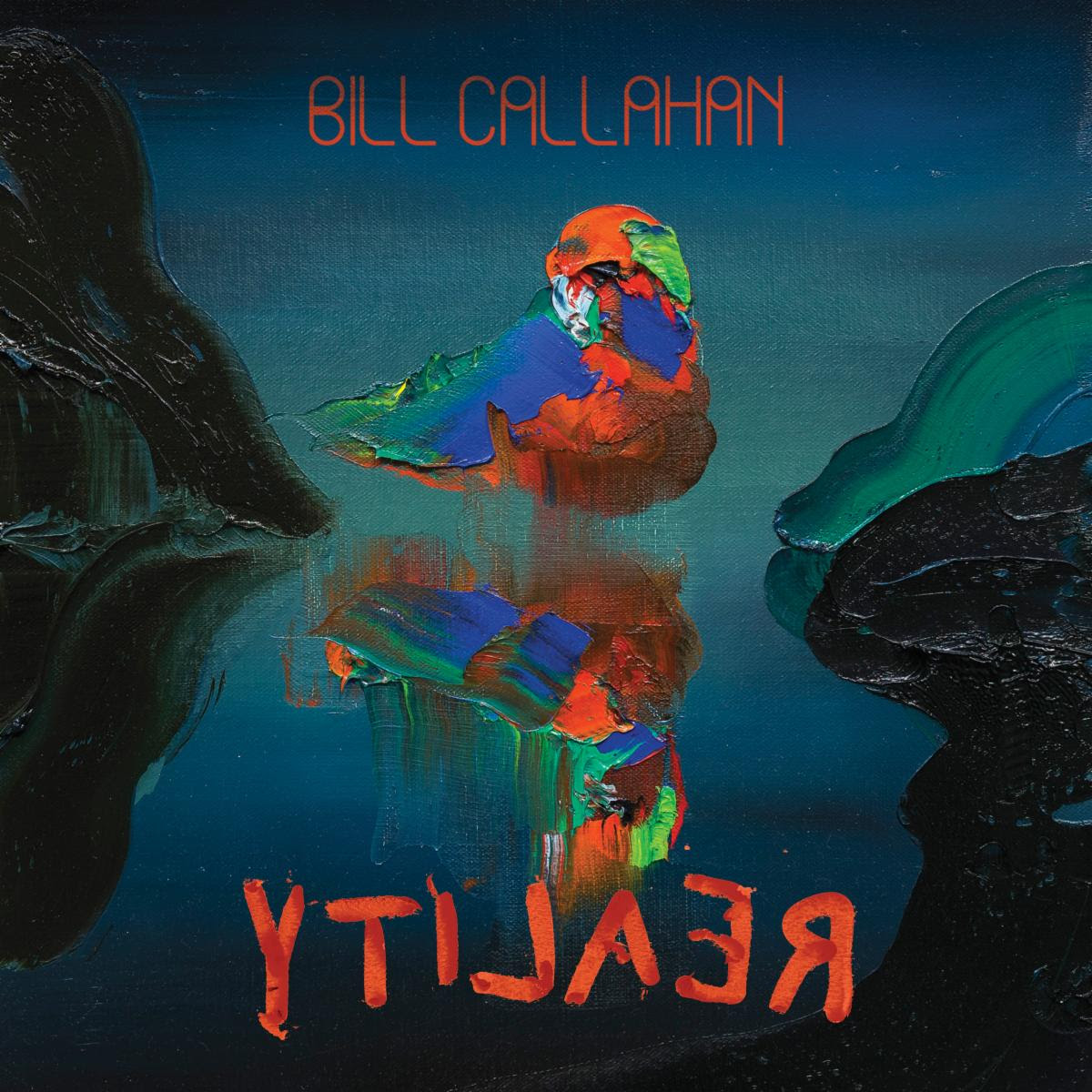
36.
Bill Callahan – YTI⅃AƎЯ
[Drag City]
Since returning from his five year hiatus with 2019’s Shepherd in a Sheepskin Vest, Bill Callahan has not really stopped doing what he does – and we’re all the better because of it. Callahan’s 19th album (if you count the Smog discography, which you should)YTI⅃AƎЯ is oddly enough his most accessible piece of work in some time. Relying more heavily on melody and robust instrumentation, Callahan gravitates towards that apocalyptic-folk he damn-near pioneered in the 90s, with tracks like “Bowevil” echoing moments from Dongs of Sevotion.
Being that it’s Callahan’s proper follow up to Gold Record, the contrast is stark, with Callahan’s lyrics evolving into more obscurity than he’s been known for recently. It may skimp on some of his traditional sentimentality in favor of more earworm moments, but rest assured YTI⅃AƎЯ is one of Callahan’s strongest albums to date, and an excellent sign that he’s nowhere close to stopping in the 2020s. – Tim Sentz
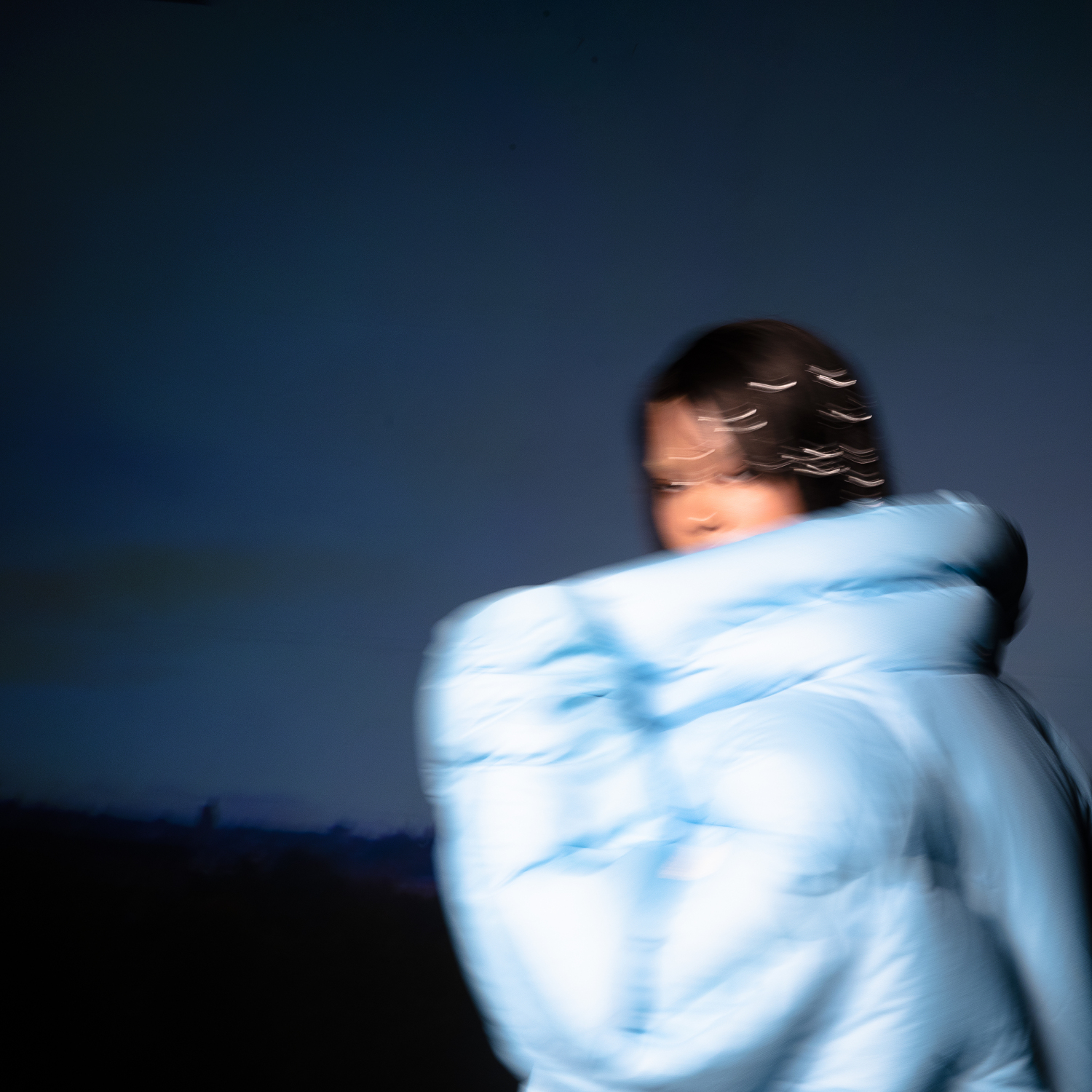
35.
Shygirl – Nymph
[Because Music]
Shygirl has an answer to all the brazen sexuality of her music, and it’s a universally resonant lyric: “Is it so bad to just like to be touched?” This nugget, from “Shlut”, is key to understanding Nymph, an emotional debut which is somehow both more dynamic and accessible than I anticipated. Try wrapping your head around “Come For Me” as it folds in on itself, then realizing that “Firefly” wouldn’t sound out of place on the radio next to Craig David. While “Coochie (a bedtime story)” works as a goofy interlude (“Somewhere out there, there’s a coochie waiting for me!”), there’s real pain here, not just snappy sex-talk. Add to that the next-level banging production from talents like Mura Masa, Sega Bodega, and Shygirl herself, and in Nymph you get the kind of post-Pop 2 record we could have only dreamt about several years ago. Of course, it could have been called Nympho, but the sex isn’t really the point – it’s about the magic in the music. – Ethan Reis

34.
Plains – I Walked With You A Ways
[ANTI-]
Contemporary aesthetics prioritize the ways in which an artist distinguishes themselves from their peers. But for centuries, and in some cultures still, an artist strove to perpetuate the cumulative standards of the masters. In traditional music, such as country, folk, and bluegrass, emulation still has its place. While many artists who work in these genres forge new melodic, vocal, and sonic gestalts, they frequently do so via long-employed templates and by re-exploring perennial themes.
With I Walked With You a Ways, Katie Crutchfield and Jess Williamson, aka Plains, navigate a fertile balance between tribute and originality. On the hook-filled “Problem with It”, Crutchfield’s irresistible vocal carries the verses; the two singers then blend their voices to offer riveting harmonies on the choruses. On the unshakeable earworm “Abilene”, Williamson depicts a couple who have wholesome intentions but can’t overcome their differences. The closing title song, brimming with seductive melodies, impeccable harmonies, and quietly dynamic instrumentation, is a waltzy tale of heartbreak and resilience.
I Walked With You a Ways illustrates how artists can borrow from longstanding parameters while still infusing their creations with immediacy. Crutchfield and Williamson may draw from the country and Americana canons (The Carter Family to Loretta Lynn to Lucinda Williams to 90s country-pop); their tracks, however, resonate as paradoxically au courant, undeniably Right Now. – John Amen

33.
Charli XCX – Crash
[Asylum/Warner]
Charli XCX is a pop visionary whose genius has been leading the genre to new heights for over a decade. Each new project of hers achieves something new, and for Crash the vision started with a tweet: “I’m interested in the concept of selling out”. Always willing to explore every aspect of pop she could, it was only natural that she finally decided to try out pop at its most commercial.
Sell-out or not, however, she is still Charli XCX, and even at her most conventional, she will never be boring. Disposing of the flirtation with the current of 2019’s Charli, Crash is thoroughly indebted to pop’s past, as we see the singer give the sounds of the 80s, the 90s and the 00s a fresh, energized touch. Charli gives her all in every song, making for an album filled with passion and infectious hooks whose replay value is unending. Charli XCX will probably return to her avant-garde tendencies soon, but Crash will always remain a monument to what she is capable of on the other end of her talents. – Lucas Martins
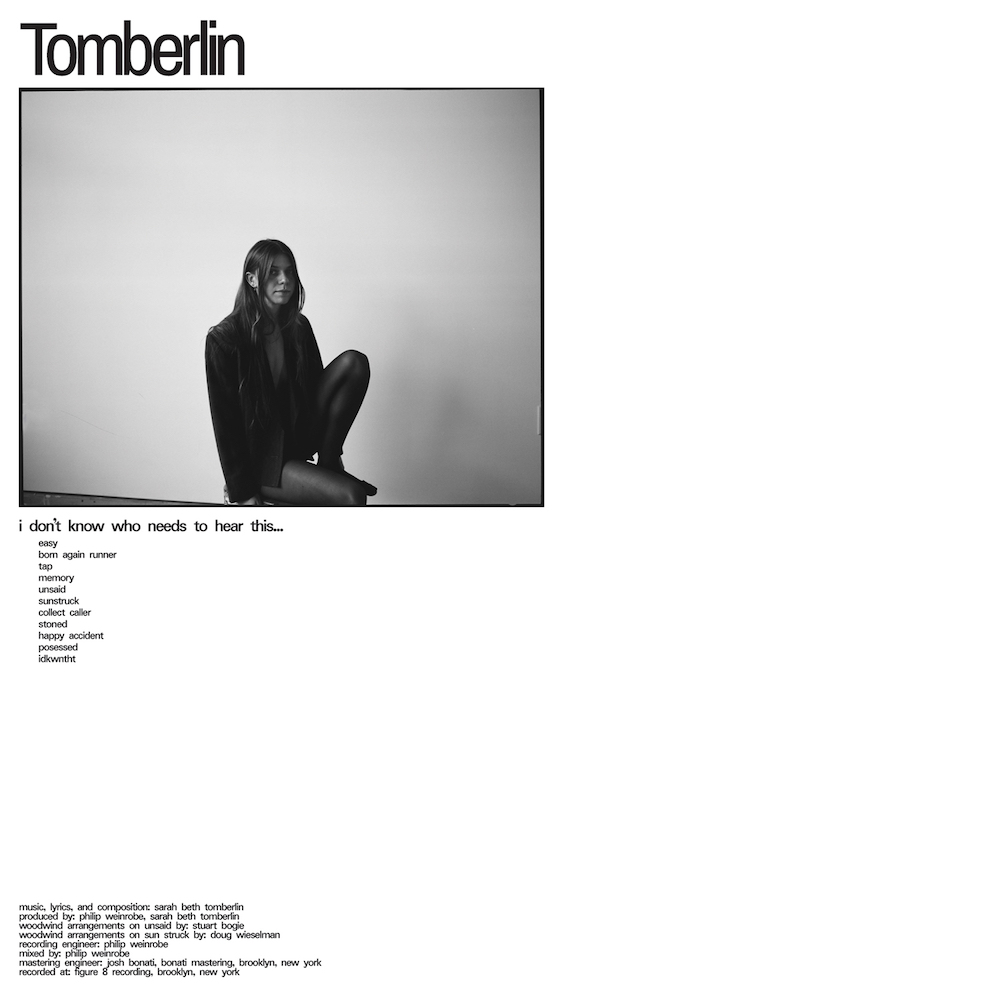
32.
Tomberlin – i don’t know who needs to hear this
[Saddle Creek]
Simply put, the music of Sarah Beth Tomberlin is a feast for the senses and, most importantly, the heart. Her debut record, 2017’s At Weddings, unwound in its own pastoral self, but the stories within its delightful exterior revealed a young, tumultuous heart struggling through faith and the abusive structures that house it. It was an intensely reflective project coiled up in timidness, uncertain of what laid ahead and above. And while this same bashful posture transpires through her sophomore effort, I Don’t Know Who Needs To Hear This; it does so with substantial emotional texture and nuance, embracing listeners deeper into her somber heart.
Heavier in emotion and more extensive musically, IDKWNTHT treats listeners to the striking maturation of one of the brightest singer-songwriter talents out there as she uproots her coy style, opting for boldness from all fronts. From the growling rocker “happy accident” to the chamber pop of “tap”, Tomberlin proves she’s longer just a folk artist — she’s slow at the core, a slacker, and a shoegazer too. This broader scope of sound and style, all meticulously crafted to hair-raising effect, renders her heavy heart and sacred stories all-encompassing and arguably more affecting. – Kyle Kohner
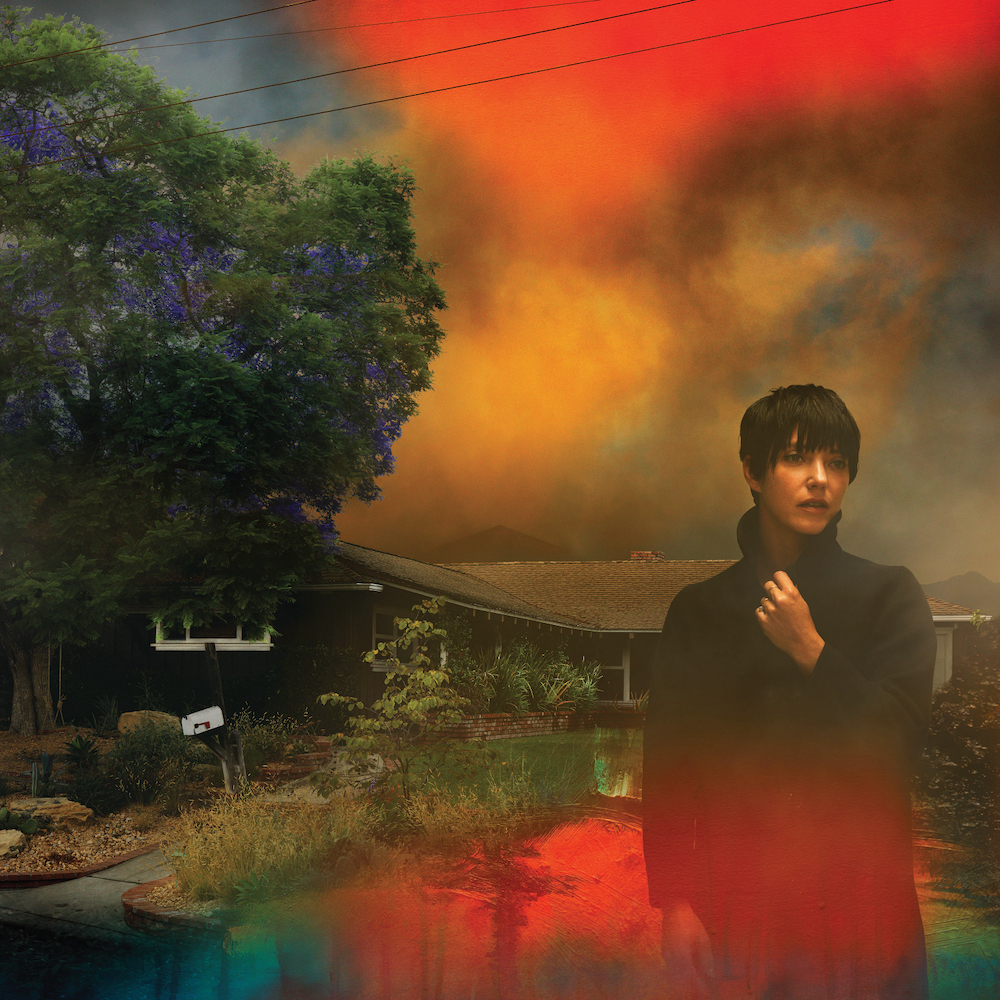
31.
Sharon Van Etten – We’ve Been Going About This All Wrong
[Jagjaguwar]
Gotta give props to Sharon Van Etten in 2022. After burning the world down with Angel Olsen on 2021’s “Like I Used To”, Van Etten released a handful of stand-alone singles before announcing her sixth album We’ve Been Going About This All Wrong a month before it was due. Even more, she purposely chose to not release any music from it for promotion, a gutsy move for anyone not on the Billboard top 100. But what came next may have surprised some – WBGATAW ended up being her best album. Van Etten’s directive made sense now: consuming the 10 track album at once, without removing pieces, made it an experience seldom acquired in the digital age.
It was riveting to listen to on the first run, its stylistic mixing bowl of ideas and lessons learned coming together potently. Incorporating experimentations she explored on Remind Me Tomorrow and Are We There, Van Etten established not just her songwriting prowess, but also demonstrated how vulnerability can sometimes bring out the best in us. If WBGATAW had been diced up and served to us piecemeal would it have been as good? Probably, but it was nice to have an album give us that classic feeling of spinning for the first time with no preconceived notions of how it should sound. – Tim Sentz
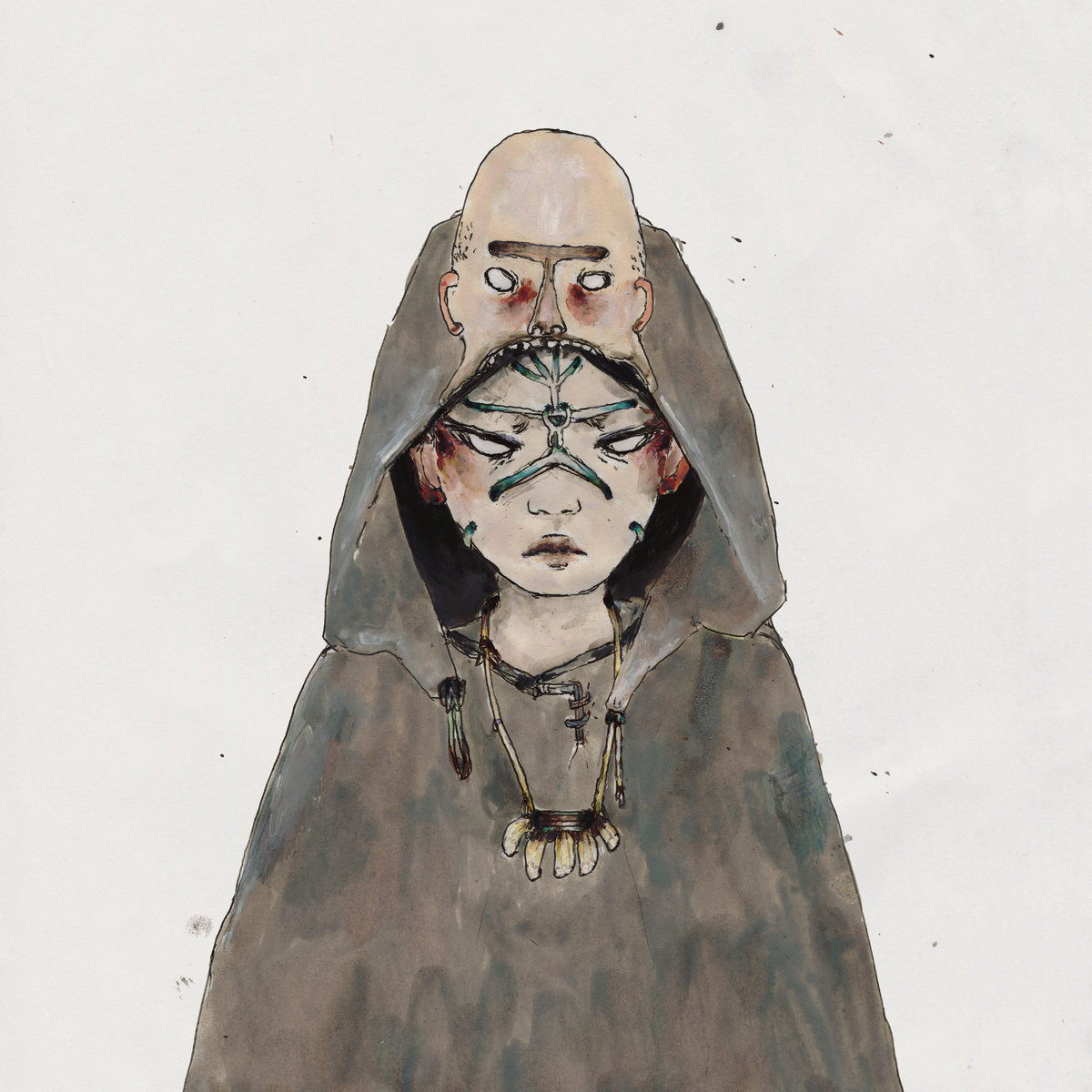
30.
Burial – Antidawn EP
[Hyperdub]
If dawn is the beginning, Antidawn is the end. Yet while Burial’s ambient EP relishes in stillness, the silences are never truly silent, and the quiet coughs and vocal samples are a sign that something lives within this work. Something is striving to continue.
Antidawn has the listener clinging to fragments of melody scattered across a desolate concrete landscape, sprouting between cracks in the pavement. Slow-moving and contemplative as it is, there’s a relentlessness present here. Burial doesn’t hamper us with repetition, instead forging a path further into his constructed aural wilderness. Here, familiarity seeps from the crevices – we’ve heard this organ before, and we’ve walked this street – as if the world of Antidawn is aligned with our own. A full-length, sparsely populated affair, the power of Antidawn lies in its versatile pertinence. – Eddie Smith
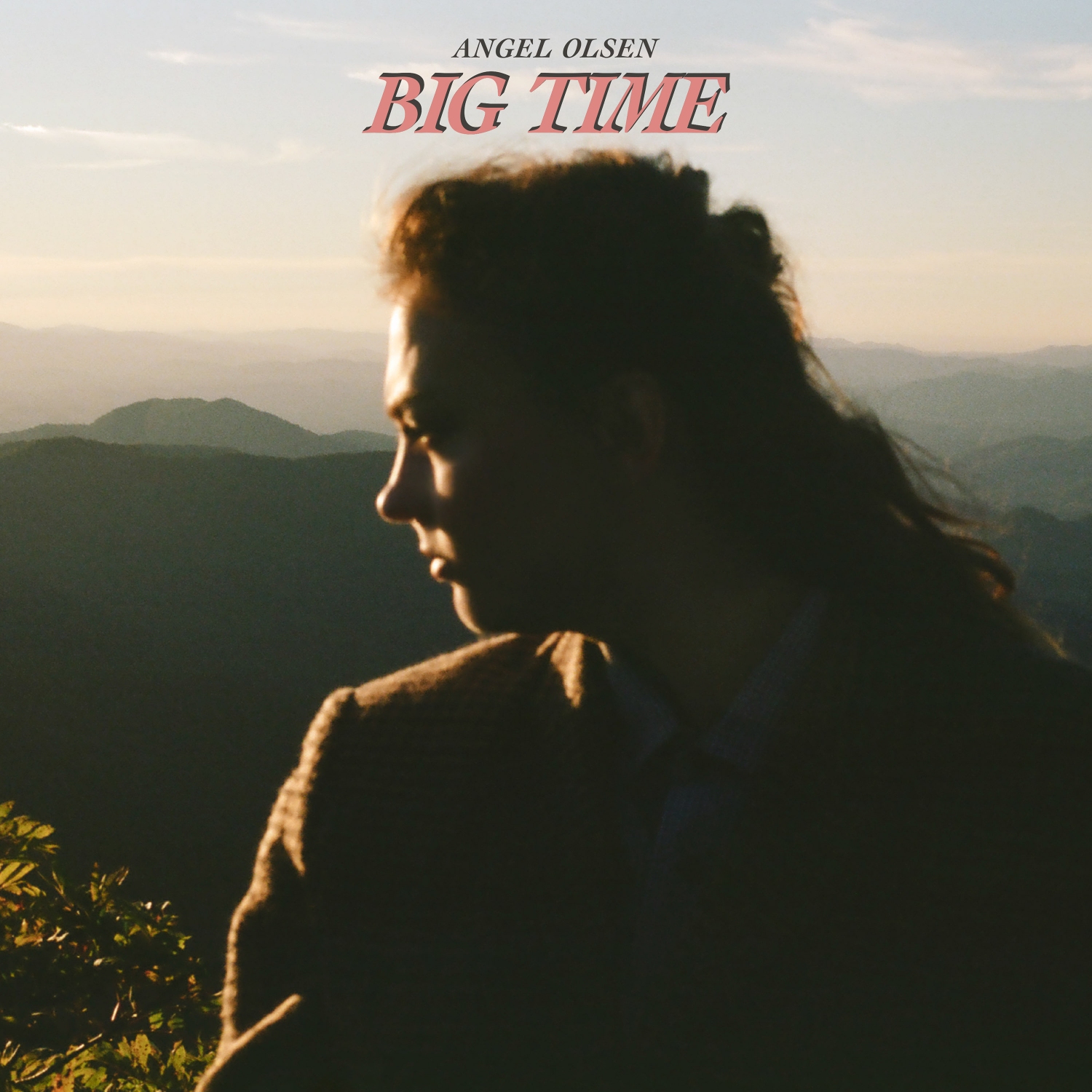
29.
Angel Olsen – Big Time
[Jagjaguwar]
With Big Time, Angel Olsen fashions a panoramic, windswept stunner of a country album – at least, her version of a country album. Born from sorrow, as many great country records are, this one came about as she was processing the death of her parents, her coming out, and the beginning of a new love. Balanced precipitously between the ache of familial loss and the joy of new affection, Olsen eased into these songs with equal ease and anxiety. The twang of pedal steel and the swift thrush of acoustic guitar shuffle alongside her piercing voice, a thing of startling clarity and emotional insight.
These songs act as conduits for intense personal assessment and aren’t satisfied with superficial sentimentality. Olsen picks at memories and painful experiences until they bleed, forcing out all the hurt they’ve collected over the years. And were she to focus primarily on the darker aspects of her life in recent years, the album would have felt bottomless in its despair, but she clings to hope and to better days, recollections of happier times and of renewals of love and companionship. And it’s here where she develops this perfect emotional equilibrium, that the full weight and impact of Big Time is fully revealed. – Joshua Pickard
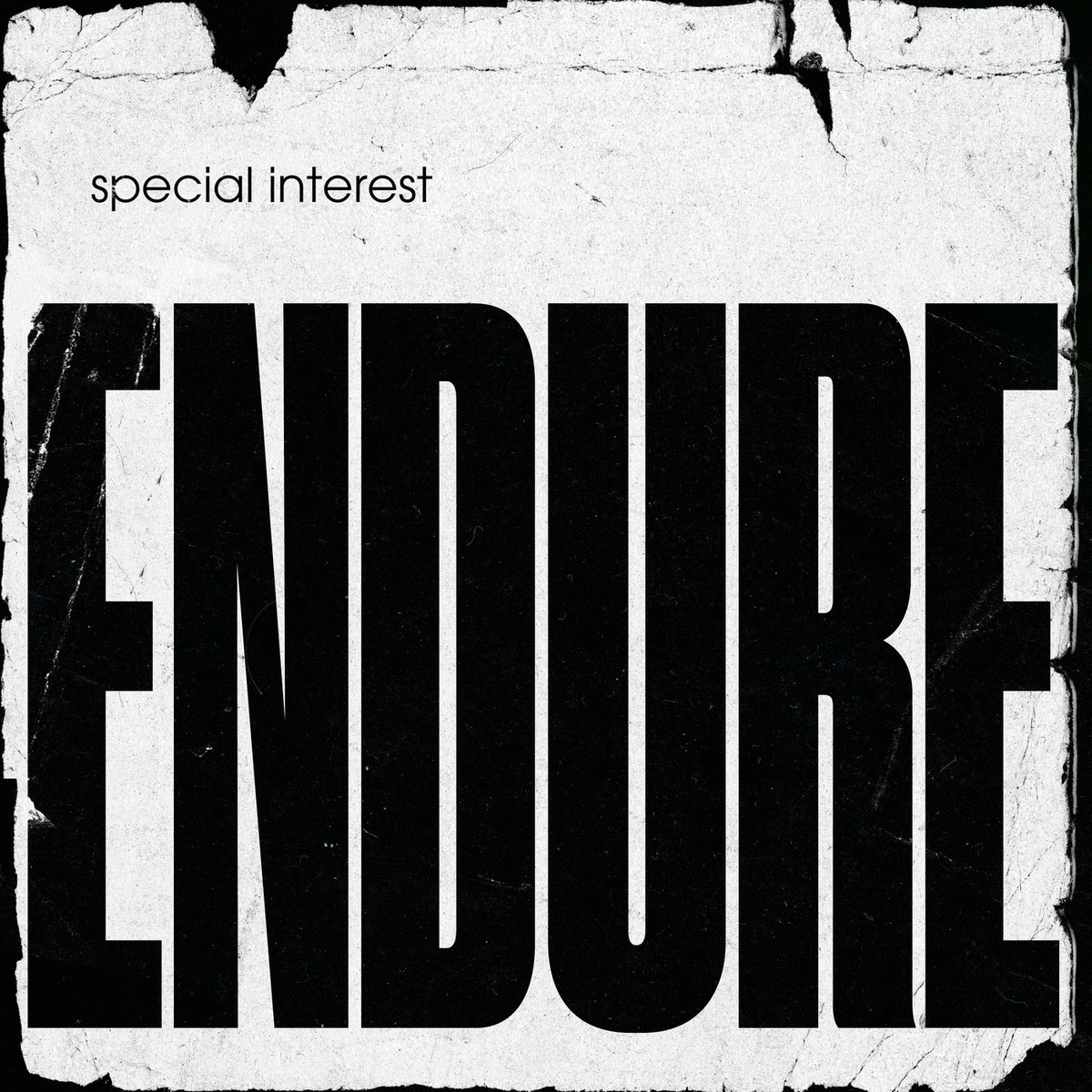
28.
Special Interest – Endure
[Rough Trade]
The New Orleans quartet Special Interest named their latest album Endure for a reason. These 11 songs offer a scathing rundown of today’s ills—from the lie of the American Dream to capitalism writ large—over an ecstatic and immersive blend of punk, rock, disco, and pop. “(Herman’s) House” swaggers with thick guitars while “Foul” bounces about with clanking percussion and unfettered shouting. Their music is the kind you could both groove and thrash to, depending on your mood.
Lead singer Alli Logout never spares a moment of intensity. They belt about their penchant for falling “for the wrong people in right places” on “Cherry Blue Intention” and raps over the disco glam of “Midnight Legend”. They give the middle finger to all things American on the dizzying “Concerning Peace” and details the mechanisms of survival on “LA Blues”. Their music hits extra hard because Special Interest, quite frankly, give a shit about our world, the people on the margins, the ones always thought of last. If they see you as part of the problem, best believe they’ll call you out, and then you can fuck right off. – Carlo Thomas

27.
Beth Orton – Weather Alive
[Partisan]
Created largely on a used, sooty piano purchased at Camden Market, and funded by a small bank loan, Beth Orton‘s eighth album Weather Alive is her first entirely self-produced LP – and by no coincidence also happens to be her best. The music itself is transcendent in the truest sense of the word; intoxicating sax performances, piano loops and incredibly soft drum playing – reminiscent in parts of early-Low – swell and shrink throughout.
But what really ties it all together is Orton’s words, and her aching lived-through voice that delivers them. Whether she’s singing about being brought to tears by the weather, dreaming of Proust or nostalgically recalling lost love, Orton remains enchanting. Though she sings of feeling displaced on “Haunted Satellite” (“I have lived as a satellite / I’ve saddled up, I’ve settled up, I don’t sit right”), never before has she sounded so sure of herself; so singular in her vision, so close to enlightenment and so capable of connecting listeners to something greater than themselves. – Tom Williams

26.
Denzel Curry – Melt My Eyez See Your Future
[Loma Vista]
If you were holding your breath, hoping for more of Denzel Curry‘s braggadocious bounce and incomparable bravado felt on Unlocked and ZUU, you’re wasting it. Exhale, open your heart and mind to a more tender and measured version of the Floridian emcee.
Melt My Eyez See Your Future parades Curry’s underrated storytelling abilities by taking his well-earned time to manoeuvre some calm, collected boom-bap beats and neo-soul production. This had been foreign territory for Curry, as he has often paired his raps with soundscapes pulled in from the very loud fifth dimension, but if there was any rapper who could adapt and wield the unfamiliar to their will, it’s undoubtedly Mr. Zeltron.
This contemplative, toned-down shift doesn’t mean Curry neglects his listeners of the occasional fast-tempo barbs or club banger; see ‘Walkin” and “Troubles” as proof. He’s just more selective these days, saving his unbridled energy when necessary. Melt My Eyez See Your Future may not be the most exciting hip-hop release of the year, but it is one of the most impressive as it furthers the development of one of the very best emcees before our eyes – melted, of course. – Kyle Kohner

25.
Björk – Fossora
[One Little Independent]
Always reinventing herself and always full of surprises, Björk added to her already sumptuous discography once again with her magnificent 10th album Fossora. A deep and detailed study of motherhood, grief, and matriarchal influence, she examines life from a cellular level to a psychological one. Self-labeled as both her “clarinet album” and her “Iceland album”, Fossora is an exquisite sound world to explore, the shimmering breaths of the woodwinds whirling about the agitated electronic beats and talk of mushrooms. It delves deep under the soil and back out again, but at the other end you come out feeling like you know more about an artist who still has so much to say. – Ray Finlayson
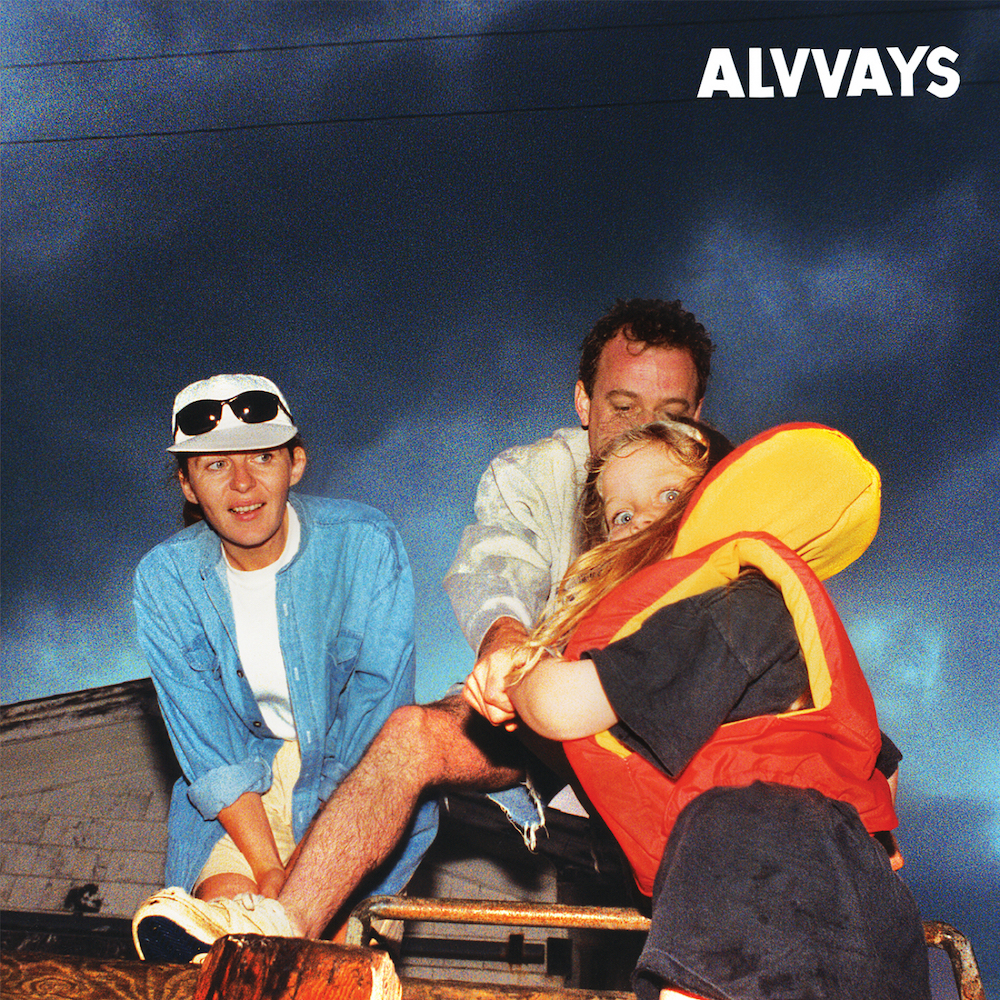
24.
Alvvays – Blue Rev
[Polyvinyl]
Just about any of the songs of Blue Rev offers a takeaway lyric, a poignant take on life that lights up a glow of recognition in your body whether you’re walking high school hallways or trudging to your office cubicle. Honing their all-encompassing pop skills on their third album, Alvvays offer slice after slice of life that is not only a goddamn treat to gobble up over and over, but also deliriously fun. Molly Rankin’s low-lit turns like those on the chorus of “Easy On Your Own?” or the hazy daze of “Tile By Tile” are wrapped up next to blistering moments of joyous energy, like the blitzing guitar on the compact opener “Pharmacist” or the haywire electricity of “Pomeranian Spinster”. It’s a wonderful package of an album that lets you leave with something new every time. – Ray Finlayson

23.
Gilla Band – Most Normal
[Rough Trade]
And now for the element of surprise! This year’s greatest punk record came out of nowhere, the third record from a band most of us had never heard of before. Gilla Band – formerly Girl Band – crafted an abstract, acidic, angular milestone that posits itself somewhere between New York’s brutal no wave of Mars and the DNA and British post-punk brutalism of This Heat and The Fall. Its precise, noise-drenched rhythms of distorted bass and mechanic guitars at times sound like gigantic, hellish machines that feed off lava and blood, while vocalist Dara Kiely delivers snarling commentary on the consumerist nature of contemporary culture. As he rants on about customers spending all their money on “shit clothes”, confesses “I hate Ryan Air” and lambasts a Jack Russell that can’t stop binging the Big Brother boxset, the world around him explodes with manic industrial clanking and crushing.
Gilla Band’s intellectual, incredibly potent anger contrasts the soccer-chant machismo of heavy indie hooligans Idles: the Dublin quartet don’t attempt brutish slogans of impotent combat, instead dissolving their enemies from the inside like an injection of Clorox or a virus. It’s the euphoric energy of Wire’s “Snakedrill”, of a new climax in modern music that heralds the end of something broken.
And the new sounds so delicious, as the group fashions complex sonic architecture around Kiely’s satiric assessments of millennial behavioural patterns with ease and grace, challenging the listener with brief moments of high pitched tones, only to appease nerves with warm, rustling noise interludes the next moment, and Kiely delivering another kick to the shins of wannabes: “A kind of cool word for savage is beast / But the thing I hate the least is the love of hating me”. Listening to Most Normal feels like bandages falling from the eyes, witnessing them live amounts to the equivalent of watching Wire perform in the late 70s. There’s no band this good around right now, and there’s been few in the past to match them. – John Wohlmacher

22.
SZA – SOS
[Top Dawg Entertainment]
With SOS, released on December 9, SZA offers her much-anticipated follow-up to 2017’s Ctrl. Featuring a lengthy roster of producers and guest artists, the album spotlights SZA’s aesthetic range and seamless eclecticism.
“Kill Bill” is a creepily instrumented and tongue-in-cheek anthem, the singer expressing a desire to kill her ex and his new girlfriend. On “Special”, meanwhile, SZA bemoans how “ordinary” she is, embracing a bubblegum hook. “Love Language” shows her craving a more meaningful connection with her partner, the chorus-splashed guitar lick and her vocal inflections pointing to a reggae influence. With “Smoking on My Ex Pack”, on the other hand, she revels in rap-braggadocio, giving her competition fair warning. “Ghost in the Machine”, featuring Phoebe Bridgers, is built around a sad-girl pop template (“I just want to fuck, sleep, eat, love happy”), SZA craving distraction without obligations (“Can you touch on me and not call me after?”). “F2F” draws texturally from 90’s grunge, sporting a buoyant melody that crosses Avril Lavigne’s “Complicated” and Sheryl Crow’s “If It Makes You Happy”. On the lounge-y “I Hate U”, the singer bemoans the way she’s treated by her lover, while on the darkwave-indebted “Shirt”, she strives to make peace with her insecurities and resentments.
One can’t overemphasize the significance of the album’s production values, each of the 23 pieces unfurling within a distinct and impeccably constructed sonic context. SOS’s songwriting, performances, and production are, in turn, flawlessly integrated, resulting in a sequence that we’ll be savoring well into 2023 and beyond. – John Amen
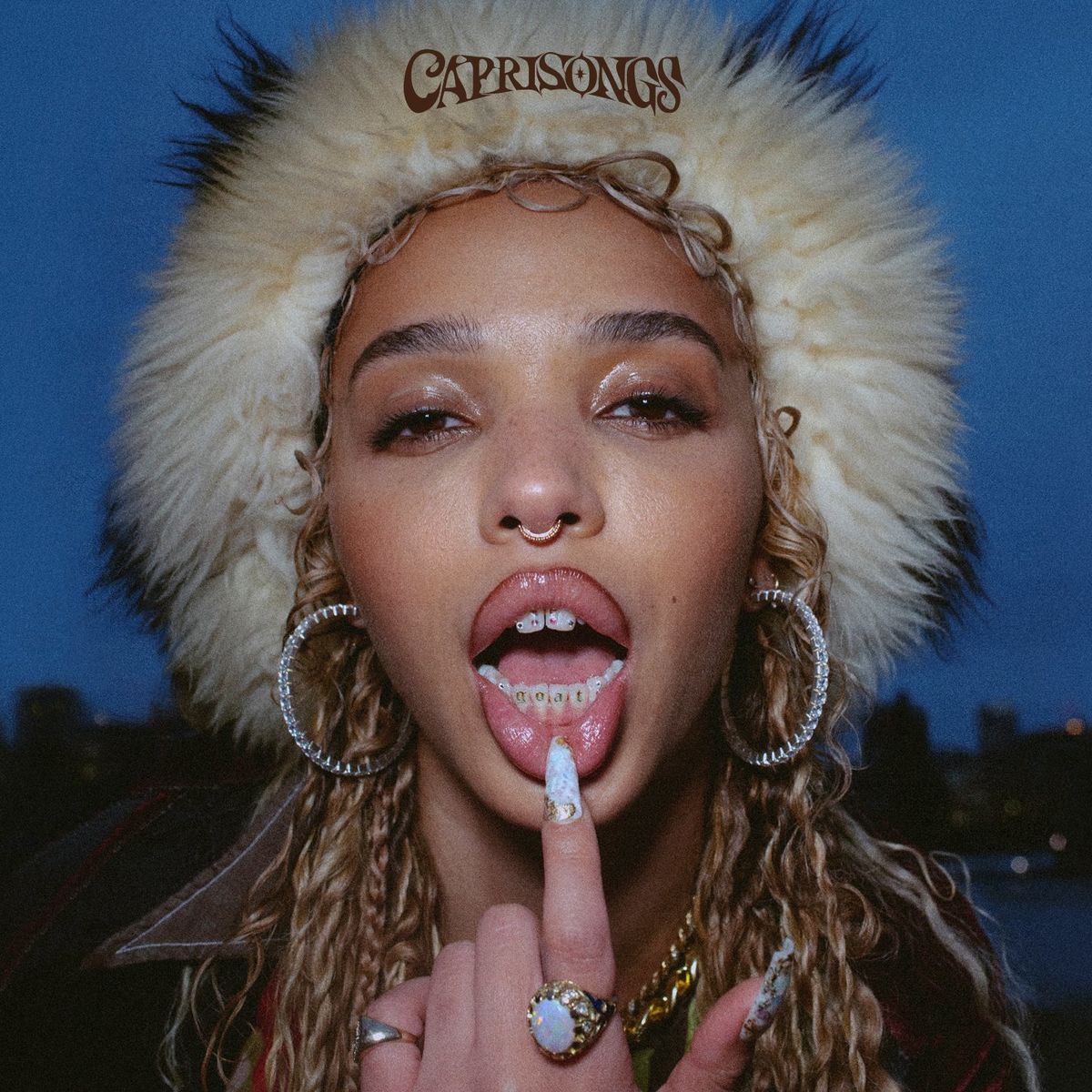
21.
FKA Twigs – Caprisongs
[Young]
If MAGDALENE was an empyrean sculpture under a solitary spotlight, the collaboration-heavy Caprisongs is an exploding piñata of pure club euphoria. It’s one of those rare records that breathes the impulsiveness of the mixtape with the narrative pull of the album. Where most mixtapes have a lot of throwaway fun, literally every song on Caprisongs ended up becoming a certified banger.
FKA twigs undoubtedly has the magnetism to gravitate the vanguard of modern pop into her very orbit. With the likes of Shygirl, Jorja Smith and Pa Salieu on board, some might feel the temptation to take the director’s chair to mold all this talent into their overarching vision. But on Caprisongs, twigs is fine with it becoming an outtakes reel instead of an arthouse film. We hear her having fun with her friends and getting to know her more mischievous side candidly: the twigs who struts the strip, gazes amorously into the makeup mirror, and cruises the interstate with the windows down. Besides, the Weeknd-featuring R&B romp “tears in the club” captures the strange exuberance of post-pandemic nightlife better than any other song. – Jasper Willems

20.
Florist – Florist
[Double Double Whammy]
In Ani DiFranco’s classic spoken word song “Fuel”, she says, “People used to make records, as in a record of an event / The event of people making music in a room.” Rarely has that been more appropriate a descriptor than for Florist’s fourth full-length record. The self-titled set was recorded in a house the group was renting out in the sticks, and most of it comes from recordings captured on the screen-in porch. For as many legitimate songs as there are here, there are basically as many interstitial interludes, improvisational musings atop the sounds of a humid nature.
That coalescence of the natural and the emotional worlds that Florist inhabit lends the album an air of true homogeneity, like it truly came from a single, ineffable moment in the band’s history, as they spent those weeks sequestered together. As for the songs themselves, they are documents of fine beauty, deep pathos, and subtly hooky melodies. “Red Bird Pt. 2 (Morning)” finds lead singer Emily Sprague singing oh-so-softly about her birth and childhood, shot through the lens of her parents’ perspective. It’s delicate and yet incisive.
Elsewhere, the mood doesn’t shift terribly, but it doesn’t need to. As we amble through other gorgeous pieces, like “Sci Fi Silence” with its glowing keys in the background or “43” with its surprisingly percussive climax, the tone stays cool. This is a lo-fi and heartfelt album, and one with a unique and piercing sense of place. As Jonnie Baker’s impromptu synth improv walks us out, we feel as though we, too, have spent a hot summer month with Florist as they crafted their strongest and most intimate record yet. – Jeremy J. Fisette

19.
Sudan Archives – Natural Brown Prom Queen
[Stones Throw]
“Only bad bitches in my trellis,” Brittney Parks sings with a splendid sense of relaxed attitude in the opening track to her sophomore album as Sudan Archives. This — after the song’s instrumental flashes through various genres at breakneck speed — is a perfect encapsulation fo what Parks does: slinky, fun, sexy, and a little funny. The song itself, “Home Maker”, is an ode to the attempt to create a space that is home, even when the person you want to share it with may want more. It’s a song about putting forth the effort, even though sometimes it still isn’t quite enough. Parks’ Sudan Archives project has been a fascinating thing to watch as it grows in stature, starting with some intriguing homespun EPs and a then a creative first record (2019’s Athena) that showed what her blend of grandiose pop, R&B, electronic, and chamber music (Parks is a beautifully talented violinist) could do on a bigger canvas.
Natural Brown Prom Queen takes one look at that canvas and says, Watch this.
Over 18 songs and nearly an hour of material, Sudan Archives’ second album blows up her work to a magnificently epic degree. This is the work of a restless creative, someone who is in full reign of her own powers and skills and knows exactly who to ask to do what and where to do it. Nary a sound out of place, Parks leads these tracks with an enviable charge. Sometimes it’s languid (“ChevyS10”, “Homesick (Gorgeous & Arrogant)”), sometimes it’s jarring and dizzying (“NBPQ”), but almost every song has a gem or a hooky earworm inside it. Parks has a sharp sense of humor to her writing, but she also knows just how to deploy emotion. Though her violin isn’t as overtly central as it’s been on her past work (here it’s often affected or processed beyond recognition, which isn’t a knock), Natural Brown Prom Queen proves that Sudan Archives is a genre-mashing aesthete, a mad scientist who’s just getting started. – Jeremy J. Fisette
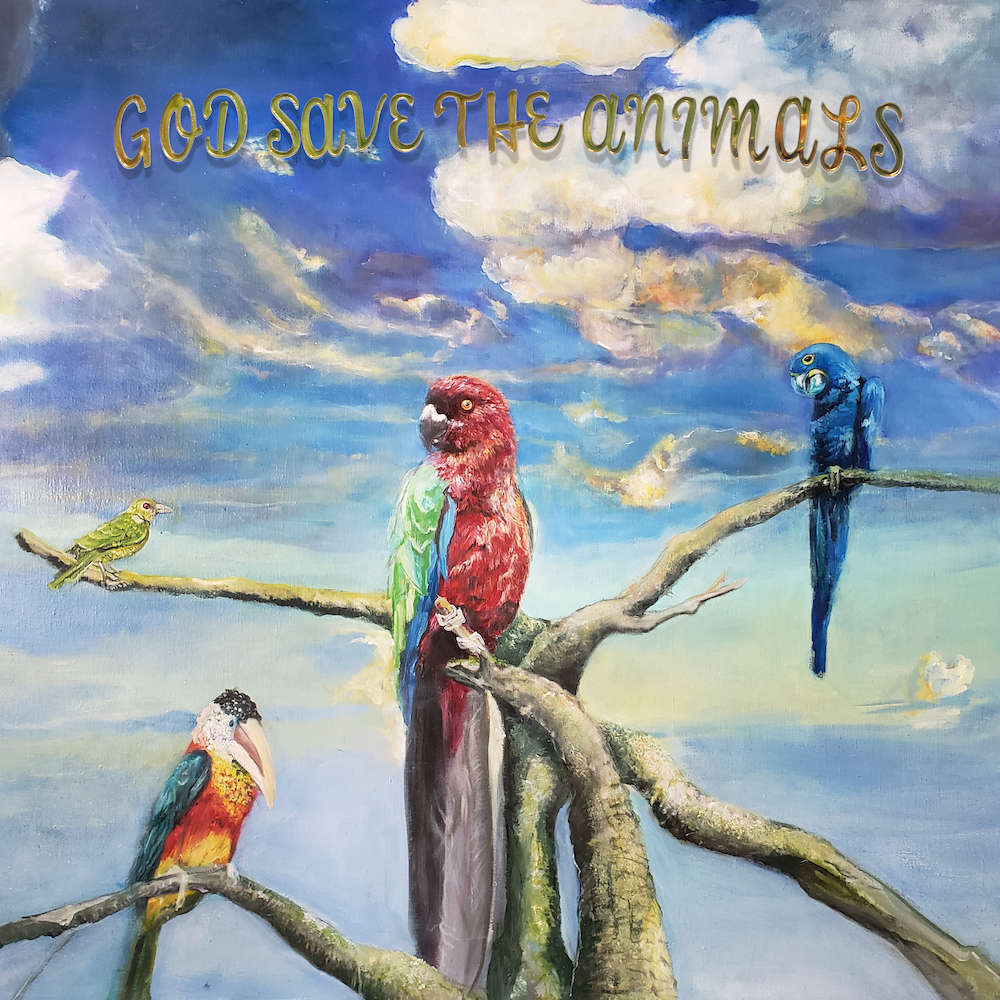
18.
Alex G – God Save The Animals
[Domino]
I first heard Alex G‘s God Save The Animals on a long flight, face peering out of the plane window. As I stared into the masses of vaporous clouds caressing what seemed to be the edge of the earth, my throat swelled with emotion. Tears fell. This wasn’t necessarily because of what I was seeing. It was the small, weird, and special music of Alex G resonating, finding me as I reflected on the transience of my own life amidst the millions of others below me. I was many miles above sea level in this moment — I should’ve felt larger than life. But Alex G tends to ground his listeners, forcing them to look inward to appreciate the miracle that we exist in our own small but unique ways.
Two weeks later, this record found me once again, striking a chord with heavier potency — this time amidst devastation. As God Save The Animals continued to grow on me and in me, as is customary with every Alex G record, I found out during this time that my 39-year-old brother, who had been battling drug addiction for 25 years, had been found dead in a ditch a week prior. A single life — unique, miraculous, and dear to me — gone.
I remain devastated, but God Save The Animals has helped me cope since. It’s wholly therapeutic because it is rooted in honesty, which is quite perplexing when considering the tongue-in-cheek spirit that courses through Alex G’s art — you never know what you can or can’t take for face value. But alas, God Save The Animals keeps memory of death and darkness while ultimately offering reprieve through forgiveness, living for the moment, for others, and seeking a future that is bigger than ourselves. It sounds like faith, but that’s hard to have when death touches you so close. Truthfully, it is hope and a nudge to keep going, and sometimes, that’s all we need.
Thank you, Mr. G. – Kyle Kohner
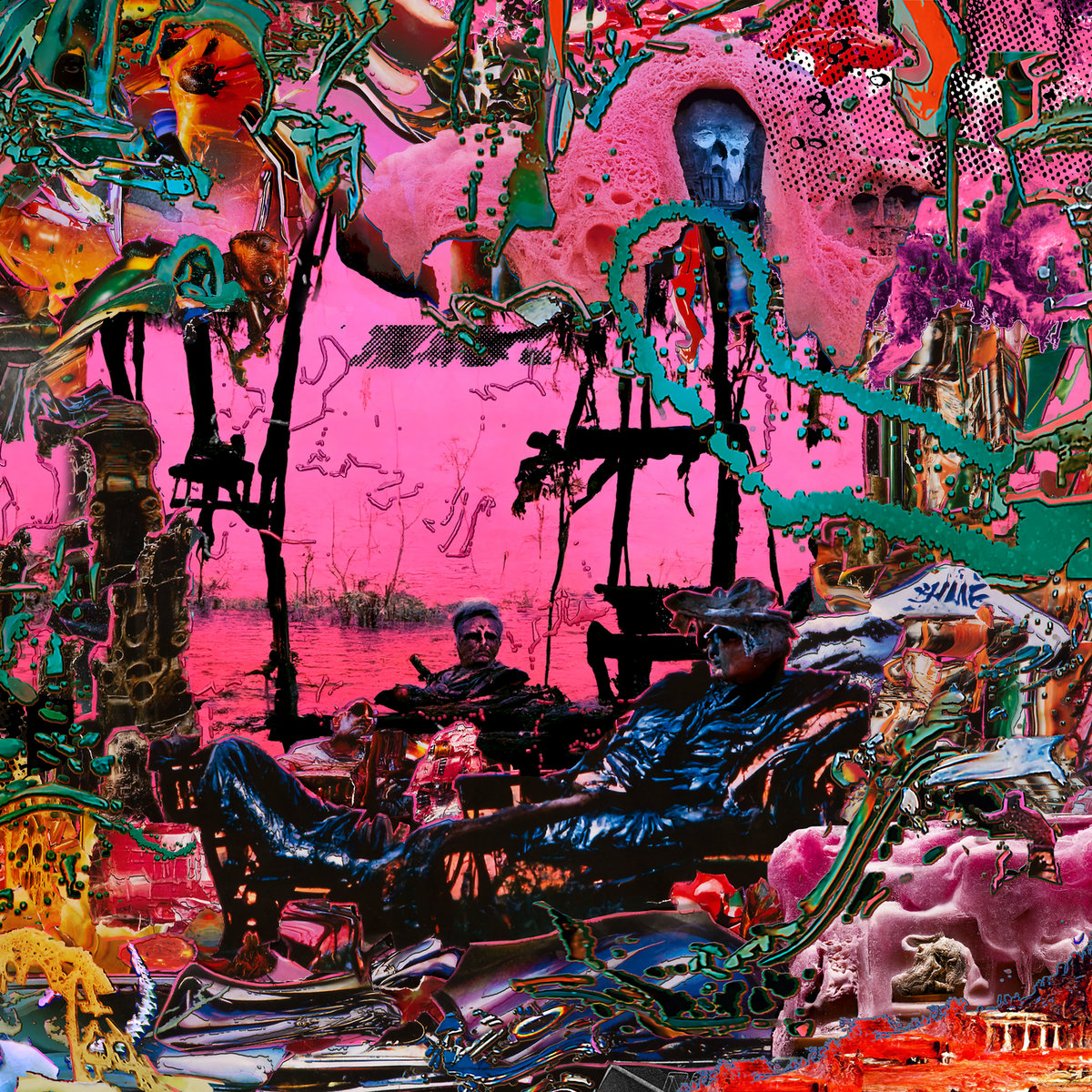
17.
black midi – Hellfire
[Rough Trade]
“Ladies and gentlemen are you ready for the sporting event of the year?” a boxing announcer asks early in Hellfire. “To the thousands in attendance, and to the millions watching around the world, let’s see some thundeeeeerrrrrr!” And black midi then oblige with rolling thunder that sputters, blasts and batters its way through the next 35 or so minutes.
You get the feeling the London trio actually do treat their music as a sporting event to some extent; how else to explain the precision, sharpness and downright breathlessness of the way they play? That they’ve managed to find trombonists, saxophonists and violinists to keep up with them is somewhat miraculous – just trying to keep up while nodding along is hard enough – but that’s just the gravity that black midi have at this point; the talent comes to them.
Hellfire marks not only the tightest instrumental record the trio has yet released, but also a significant level-up lyrically. Fed up of being ambiguous, Geordie Greep has gone deep on narrative, from narrating a boxing match between Sun Sugar and Sun Tzu to regaling us about the hellish shame of a hired murderer, his tales are as unique and unpredictable as the playing. Cameron Picton, when he gets his turn, gives us an equally upsetting tale about a cannibalistic captain of a mining company.
All in all, Hellfire is a whistlestop tour through the underworld wrought in vivid detail. It won’t be for everyone, but for those who like to take a rollercoaster ride through the dark side, it’s addictive as sin. – Rob Hakimian
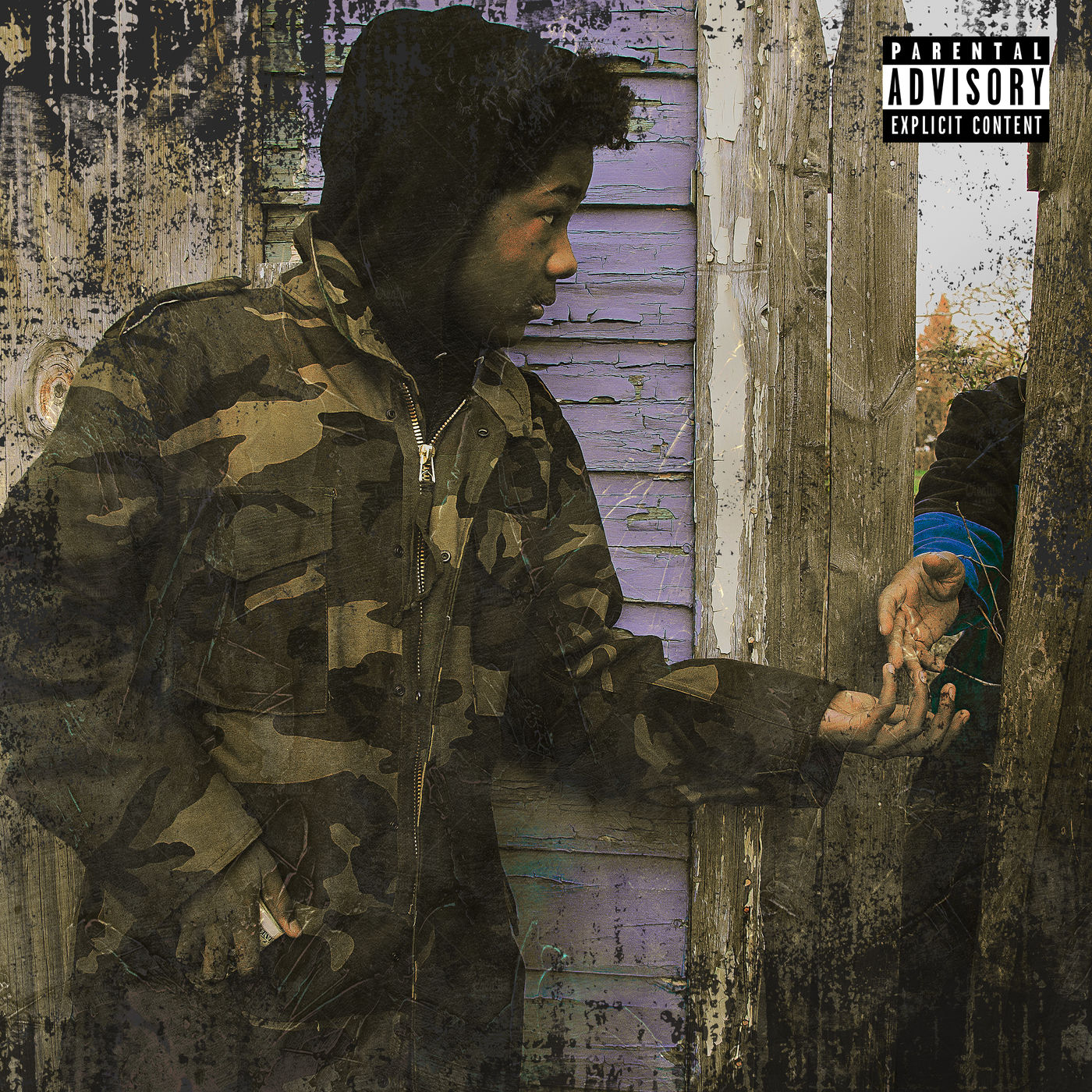
16.
Conway The Machine – God Don’t Make Mistakes
[Shady/Interscope]
The wait for Conway the Machine’s Shady Records debut was nearly an interminable one, but its grand arrival after years of waiting proved more than worth it. Griselda are a tricky bunch to nail down: at first my favorite member was Westside Gunn, thanks to his unique voice and flamboyant presence, then it was Benny for pure lyricism, but gradually, through sheer hard work, Conway has arrived at the top of the mountain.
From the moment you click play, God Don’t Make Mistakes is all business, getting right down to it with an ominous soundscape featuring none other than Beanie Sigel. From there, things don’t let up, with boasts and threats flying freely without remorse. Yet, the core of the album’s beating heart is the pain the rapper has gone through to reach this point. Even in the midst of the most aggressive song, he’ll slip in a line about his facial paralysis, and then there’s “Stressed”, in which the rapper lets every aspect of his life spill out into the open, resulting in a bracingly emotional display.
There isn’t much more to say, but with perfect deployment of guests, ominous, layered production, and quite simply, an all-consuming performance from Conway himself, it’s easy to declare God Don’t Make Mistakes exactly what it is: the tightest, most carefully constructed Griselda project to date. – Chase McMullen
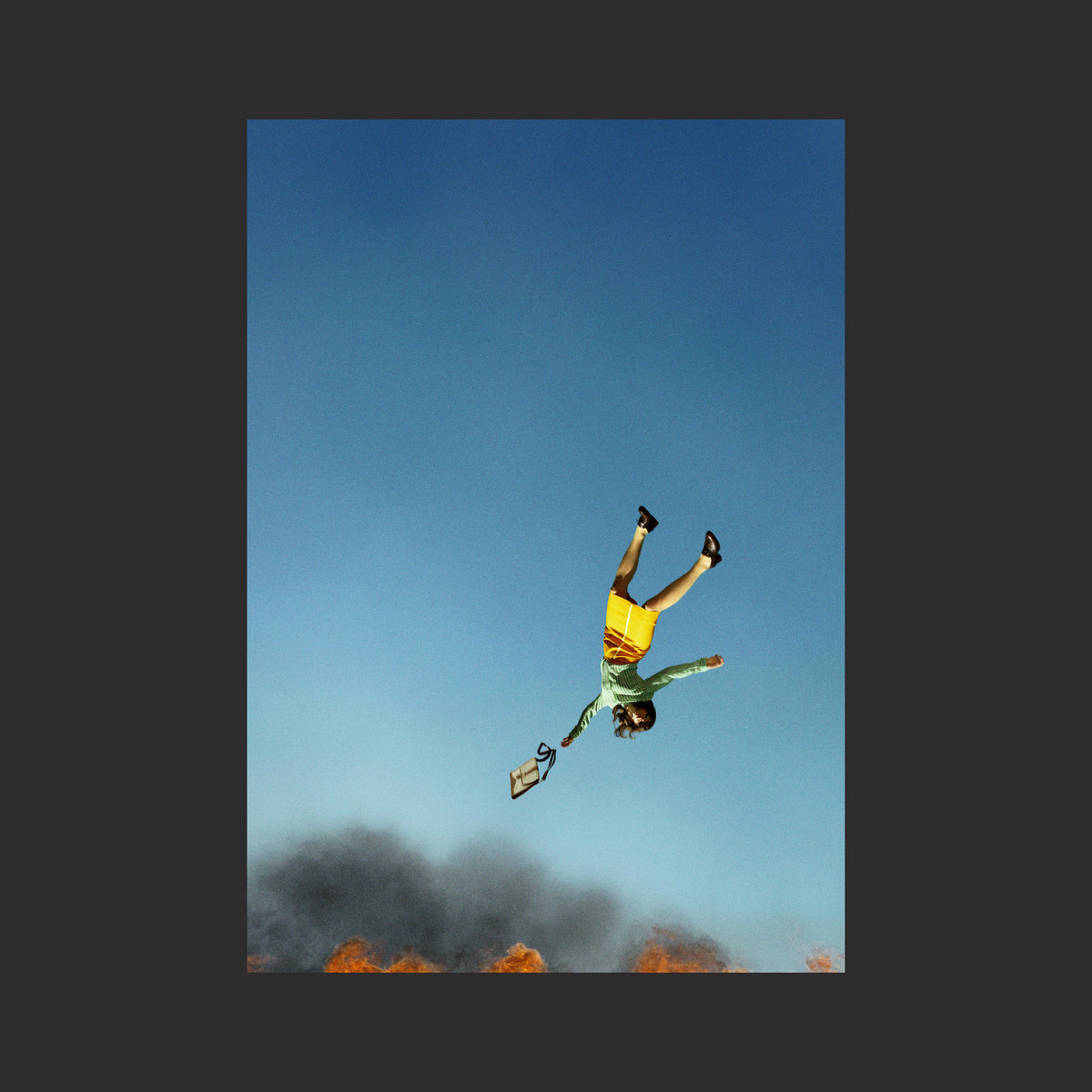
15.
Yeah Yeah Yeahs – Cool It Down
[Secretly Canadian]
Almost any hesitation we had as we anticipated the release of the long-awaited fifth record from Yeah Yeah Yeahs is dispelled the moment we hear Karen O, in her typical swagger, spit the first word of the record: “Cowards!”
It’s a moment of total, elemental attitude, and one that is carried through most of Cool it Down. It’s always interesting to hear a band come back from a long hiatus — in this case nine years — because we never really know what we’re going to get. Will it be a pale impression of their old tricks, as the band grasps for relevance? Will it be something refreshingly new for the group, but a bit of a miss in the end? Luckily, Cool it Down strikes a careful balance between giving us what we want, and showing a path to a future for a band that many possibly thought was done.
This is not a huge, grand return to the fiery piss-and-vinegar of yore, nor the sleek disco-adjacent rock of It’s Blitz!, and (maybe most pleasingly) it isn’t a hark to the scattershot Mosquito. This record is majestic and glistening, something like Yeah Yeah Yeahs in cinemascope. “Spitting Off the Edge of the World”, replete with guest warbling from Perfume Genius, is a powerful mid-tempo ballad, a ballsy move for the opening of what is essentially a reunion record. “Wolf” is full of Eurythmics-esque synths and stabs. “Fleez” sounds like something that could’ve been written around their early years, but only developed this way at this point. Best of all is “Burning”, a truly epic, earth-melting song, with Karen O singing over pianos, percussions, and ever-growing sense of doom and dread, until we get to the flashy finale.
At the end of the album, Karen O walks us through, in plainspoken speech, a memory with her young son, and how the two of them love watching the stars. It’s a lovely and sweet moment, from one of rock’s most infamously extravagant and badass frontwomen. But what this, and Cool it Down in general, shows is that you can be a badass without being surrounded by the noise and chaos all the time. Sometimes, when you reign it in and stay totally in control of your power, that’s the greatest weapon of all. And alongside such pros as Nick Zinner and Brian Chase — who, for their part, miss nary a beat along the way of this short but varied LP — the trio prove why we never should’ve counted them out. – Jeremy J. Fisette
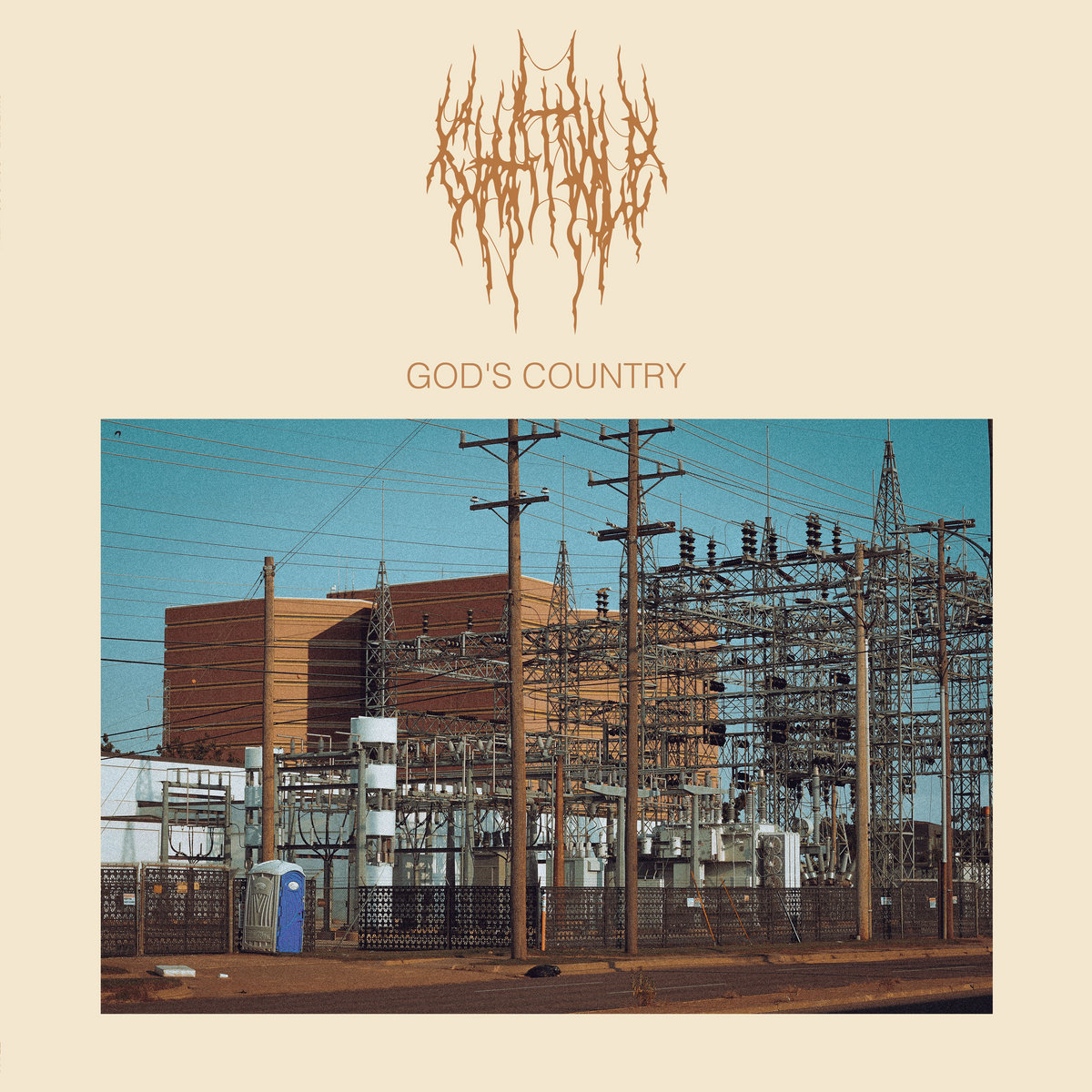
14.
Chat Pile – God’s Country
[The Flenser]
Resting somewhere at the crossroads of sludge metal and noise rock, Oklahoma’s Chat Pile cull amusement from the insanity that surrounds them – namely the tri-state area of Oklahoma, Kansas, and Missouri’s often-ignored history with poisonous waste deposits known as chat piles. As they navigate the Bible Belt’s shortcomings (there’s a lot), they pretend to be a fictional serial killer of camp counselors, provide commentary on the homeless population and lack of resources, and wrap it all up with visions of a fast-food purple blob getting high.
God’s Country feels slightly indebted to the sophomore album Iowa by the masked metalheads Slipknot, who spent their entire second album going even darker than their debut, thus making it cool to talk shit on your home state. Chat Pile’s not bitching and moaning though, there’s genuine optimism hidden in all of singer Raygun Busch’s darkly humorous storytelling. All of their album and single artwork depicts landmarks for them as an off-kilter homage to the Sooner State, and while nothing about God’s Country will make you a fan of Oklahoma, it will draw you into the wonderfully doomed world that Chat Pile has exposed us to. – Tim Sentz

13.
Dry Cleaning – Stumpwork
[4AD]
London outfit Dry Cleaning made a quick follow-up to their critically-acclaimed 2021 debut New Long Leg. Stumpwork expands the world of primitivist post-modernist observations and intrusive thoughts set to dissonant yet laid-back post-punk instrumentals. Dry Cleaning have solidified their sound to the point where it is unmistakable: minimal instruments accompanying vocalist Florence Shaw’s cold and monotonous singing, which is reminiscent either of Laurie Anderson or Kim Gordon.
However, on Stumpwork they go beyond straight-forward post-punk. Clear nods to jazz and post-rock from acts such as Do Make Say Think are present and enhance the feeling of dizziness, while at the same time bringing a new sense of confidence in the band’s sound. It seems that the expanded range of musical influences on this album lets it breathe freely — almost appearing to playfully dance about Shaw’s lyrics.
The vocalist does not only sing (or rather almost speak) with a cold and distant tone, she has lyrics to back her up. They are what could be described as “existentialist satire” — think Charlie Kaufman doing stand-up comedy. Shaw’s lyrics are tense accounts of modern life which urge the listener to take it easier, hence, the satiric and ironic angles. Shaw does not sing in a monotonous voice to seem cool, she does so because it perfectly suits the banality, horror and meaninglessness of most everything she sees in front of her. That is unless she goes for a made-up sentimental piece, such as “Gary Ashby”, which adds yet another dimension to the album. – Aleksandr Smirnov

12.
Backxwash – His Happiness Shall Come First Even Though We Are Suffering
[Ugly Hag]
As the final act in a self-described trilogy – following 2020’s God has Nothing to Do with This Leave Him Out of It and 2021’s I Lie Here Buried with My Rings and My Dresses – Backxwash’s latest album, His Happiness Shall Come FIrst Even Though We Are Suffering, is a colossal monument to the ways in which we process trauma and seek to disengage ourselves from the emotional devastation we carry around with us.
Blending horrorcore vocals with splintered genre excavations, these songs feel like unshackled electricity running through your body, like an inexorable tidal wave of fury washing over you and leaving nothing but ruin in its wake. You feel excoriated but somehow cleansed in its passing. It’s not a difficult listen so much as it is one that lays us bare, stripping away all our defenses until we’re left exposed and bare to the elements. This is the power of these songs: sharp, turbulent, vicious, and desperate to know if anything good can come from so much suffering. And if we can turn our own broken histories and intangible injuries into something resembling hope (even settling for some sort of emotional sustainability), what happens next? If you dig deep enough into this album, the answers will come, though they might not be the ones you were expecting. – Joshua Pickard
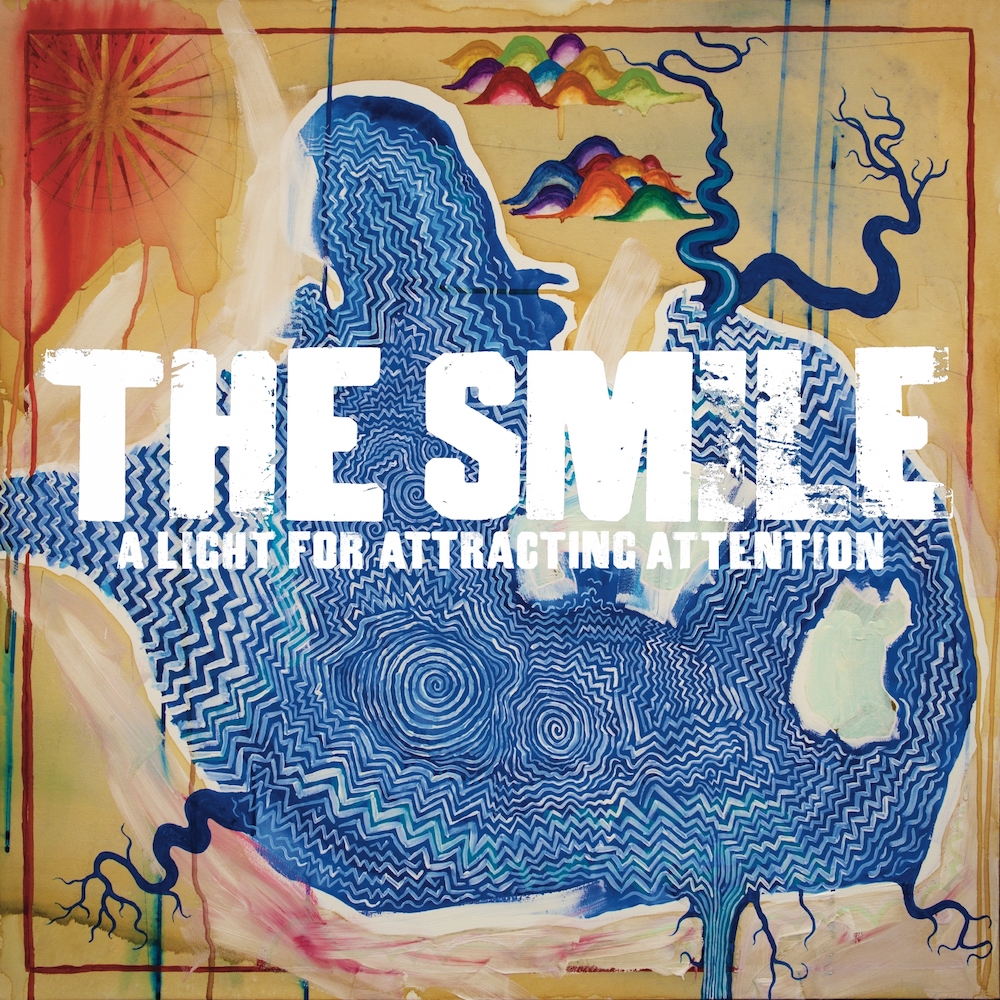
11.
The Smile – A Light For Attracting Attention
[XL]
A Radiohead album by any other name, eh? But there is more going on with The Smile‘s A Light for Attracting Attention than just this simple characterization. Thom Yorke, Jonny Greenwood, and Tom Skinner have married the experimental tendencies of both Radiohead and Sons of Kemet (for whom Skinner drums) and created an album that feels beautifully byzantine, filled with profoundly moving melodies and a strange sense of humility.
For such musical luminaries, this album does feel at times rather unassuming, confined to a singular purpose and prose before shedding its outer layers in favor of something grander in scope. Yorke’s voice has never sounded more incisive, while Greenwood and Skinner provide plentiful space in which it can move and cling to the music. The record rewards longtime fans with rhythmic asides to earlier Radiohead work, finding a balance between the strict mechanics of their dismantled rock noise and the heady electronics of later-era releases. It’s both past and future for the band, revision and adaptation – and maybe even a glimpse of what to expect should Radiohead find time to release an official follow-up to A Moon Shaped Pool. – Joshua Pickard

10.
Weyes Blood – And In The Darkness, Hearts Aglow
[Sub Pop]
It has been said many times before (and will likely be said many times again), but Natalie Mering has a way of conjuring music that feels like it has been playing on AM radio for decades. The warmth she suffuses across her tracks on her latest Weyes Blood album, And In The Darkness, Hearts Aglow, is no different. She glides over chord patterns that feel familiar and swims through harmonies that feel second nature to your ears. You will swear you have heard the upbeat shuffle of “The Worst Is Done” years ago at a bar, felt the ethereal softness of “God Turn Me Into a Flower” coarse through your body during a delicate moment of your life, or written the album’s opening line (“Sitting at this party / Wondering if anyone knows me / Really sees who I am”) in your diary one late night after returning home alone.
This is a beautiful record through and through, another highlight in Mering’s already brilliant discography. And judging by the critical response overall and the fact it made it onto BPM’s End of Year list, it’s not just me who thinks this, it’s everybody. – Ray Finlayson
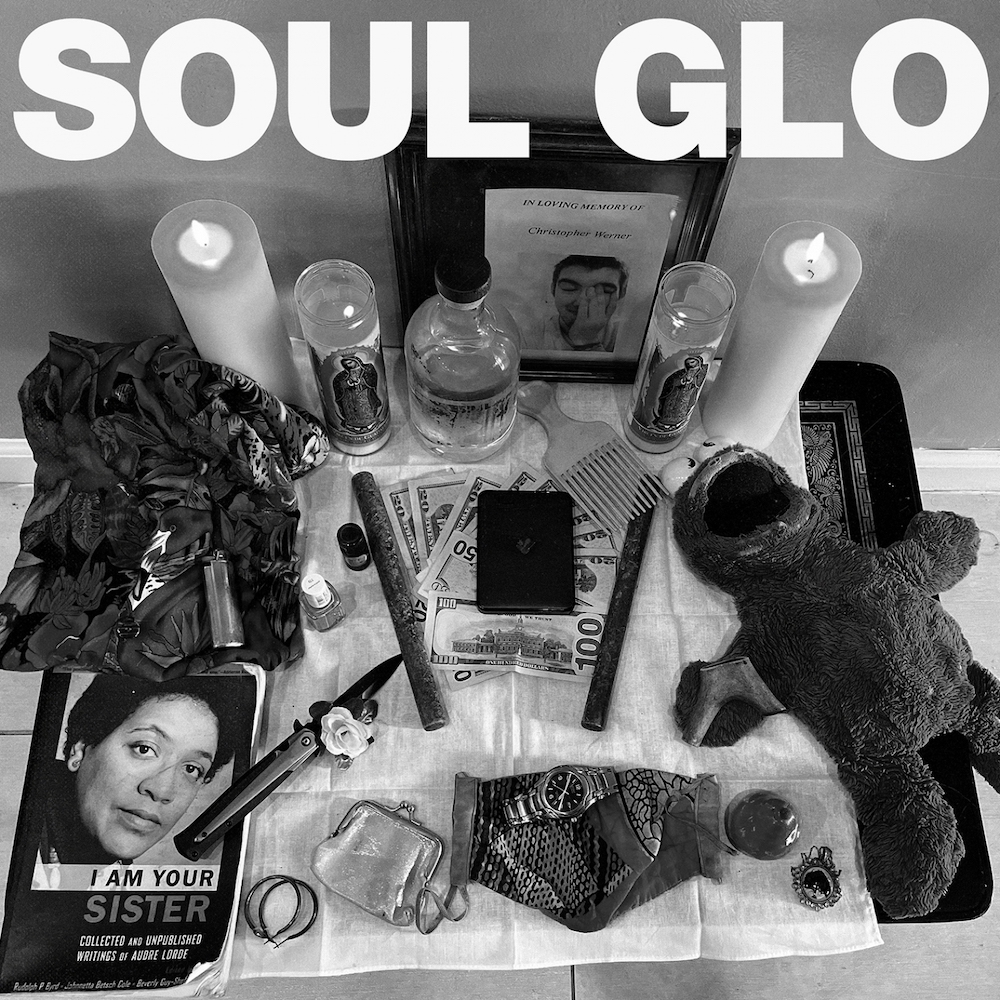
9.
Soul Glo – Diaspora Problems
[Epitaph]
Soul Glo’s Diaspora Problems is frustration made manifest, an almost physical reaction to indifference and inaction on the part of politicians, social revelators, and ineffective allies. After years of seeing their words fall on deaf ears, the band has channeled their anger and disappointment into the hulking hardcore behemoth of Diaspora Problems, leaving nothing but scorched earth in their wake. No one is safe from their thrashing punk fury, the left and right are seen as equally useless in their respective machinations and opaque political maneuverings. These songs will fuck you up and aren’t afraid to burn every bridge they come cross.
The album is carved out by acidic vocals, densely splintered guitars, and acres of pummeling percussion meant to abolish any sense of vagaries concerning their collective frames of mind. But they never dip into abject nihilism – which, given the ideas they explore and dissect, is a feat unto itself. Opening the album with the words “Can I live?” repeated over and over again, they peer into the void and snarl as it cowers under their gaze. They see everything in its starkest truth with nothing to mask the ugly realities hidden within. These songs are treatises on generational trauma, on the scars on Black souls, and the apathy of powerful men and women operating without oversight.
At times, the howling voices in these songs become a smeared blur, an elemental roar that renders words irrelevant. What we need is action, not more banal speeches done for the benefit of cameras and poll numbers. Diaspora Problems has a voice which needs to be heard, needs to be understood. And in these 12 tracks, we hear a call-to-arms for every marginalized and forgotten people. Stand up, demand accountability, and make some goddamn noise. – Joshua Pickard
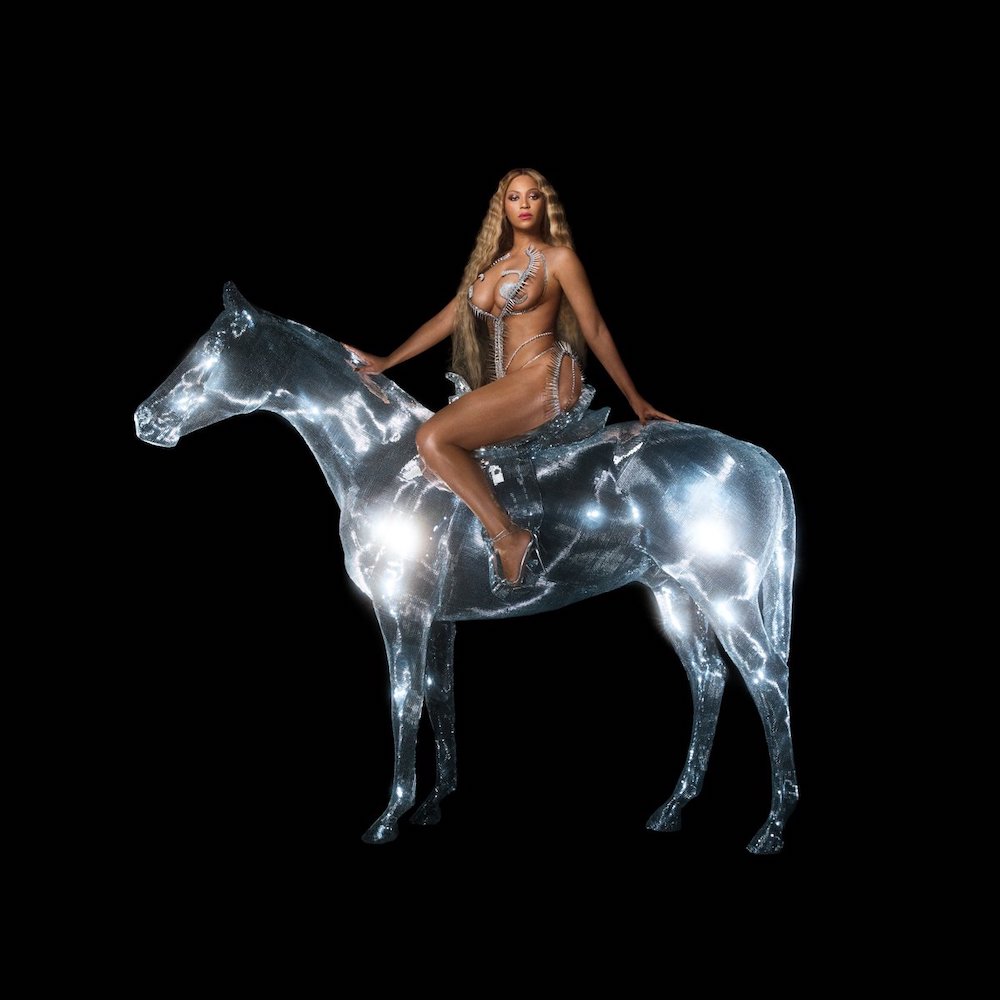
8.
Beyoncé – Renaissance
[Parkwood/Columbia]
The latter half of Beyoncé’s discography explores the different facets of liberation. BEYONCÉ was liberation from industry expectations and a resuscitation of the mainstream album format; Lemonade was liberation from the wounds dealt by racism, misogyny and her own experiences with disloyalty. However, it is with her long-awaited Renaissance album that Beyonce decided to fully embrace the freedom of self-love, sex and all-encompassing fun. A bonafide dance project that is unapologetically self-praising, fierce and erotic, Beyoncé proves her grip on the reins of pop culture never loosened as she ordered us back to the clubs and to leave our humility at the door.
From the galactic thundering of “Alien Superstar”, to the tongue-in-cheek gospel fanning of “Church Girl”, the six-minute disco funk of “Virgo’s Groove”’ – and even a brush with PC Music on the aggressive and underrated cut “All Up In Your Mind” – Beyoncé cuts a path on the dance floor with her sharpest stilettos. Renaissance demonstrates how self-empowerment should be lux and decadent, in-your-face and unrestrained. The fact that this is touted as only Act 1 means you should save room for dessert because she is not done serving yet. – JT Early

7.
Jockstrap – I Love You Jennifer B
[Rough Trade]
It’s always a thrill to see a debut album make a well-deserved splash through the music community. In Jockstrap’s case, the splash comes through distorted pulses and windswept strings, nightmarish synths and lo-fi bedroom meditations, oftentimes within one song. The UK duo of Georgia Ellery and Taylor Skye do it all, striking a balance between their electronic experimentations and indie rock sensibilities with an orchestra to boot. These musical combinations sound ambitious at best and misguided at worst. Yet I Love You Jennifer B feels vibrant and original, the result of musicians who’ve crafted their songs with meticulous detail.
Listen to how the electronic ripples over “What’s It All About?” creep in like a chill down your spine and the interplay between Skye’s yearning vocals and the lightning fast synth lines on “Concrete Over Water”. Or how the disco-inspired “Greatest Hits”, with a rhythm underscored by bouncing percussion and incessant piano notes, delivers moments of swooning elegance. Importantly, none of these 10 songs sound overly fussy or stilted. Quite the contrary, I Love You Jennifer B provides proof that music can be more than the sum of its parts. – Carlo Thomas

6.
Kendrick Lamar – Mr. Morale & the Big Steppers
[Top Dawg Entertainment]
“Abandon all hope, ye who enter.
“This is not for you.
“I’ve been going through something.”
Oh boy, did he mean that…
While To Pimp a Butterfly will always stand as the peak of his career and Good Kid, m.A.A.d. City is my personal favourite, Mr. Morale & The Big Steppers is probably Kendrick Lamar‘s best record.
A two-disc double album whose songs reflect each other, (example: compare the thematic reworking of trauma in “We Cry Together” and “Mother, I Sober”), Lamar’s No. 6 is a personal, therapeutic and decidedly black work of art. Moreso than any of his previous albums, it’s a letter to his people, addressing generational trauma and racial struggle via auto-biographical psycho-analysis. It goes places which have rarely been touched with such direct brevity in the rap genre, maybe only comparable to TA13OO’s insistence of discussing significant trauma.
Given the album’s emotional tone and experiential quality, it forces listeners outside of the Black experience to actually listen to perspectives that aren’t their own. Much of what Lamar addresses here is indeed taboo, and he goes as far as to openly acknowledge that: “A conversation not being addressed in Black families / The devastation haunting generations and humanity / They raped our mothers, then they raped our sisters / Then they made us watch, then made us rape each other / Psychotic torture between our lives, we ain’t recovered […] Still livin’ as victims in the public eyes who pledge allegiance / Every other brother has been compromised / I know the secrets, every other rapper sexually abused / I see ’em daily burying the pain in chains and tattoos.”
“Mother I Sober” might be the most striking moment of the record, opening a conversation that all too often is obscured by shame and tensions resulting from power imbalances. Yet the thematic density of the record allows for many equally striking and shocking high points. There is the painfully realistic fight of “We Cry Together”, where Taylour Page steals Kenny’s show with her intense delivery and breaking voice. On the grim “Worldwide Steppers”, Kendrick shocks listeners awake with a sudden admission of sexual relation that rips the song’s emotional core wide open. On “Auntie Diaries”, he addresses the complicated history in the Black community with trans- and homophobia, with a last line to the song that led to controversy, but hit the nail on the head in terms of how insensitive behaviour is marred in perception. All of these moments are transgressive with surgical precision, rich in emotional depth.
What seemed stranger was the inclusion of Kodak Black, whose abusive history is well documented – yet the choice fit Lamar’s christian perspective of spiritual forgiveness even for the worst offenders, echoing the call to break cycles of abuse in “Mother I Sober”: “So I set free the hearts filled with hatred, keep our bodies sacred / As I set free all you abusers, this is transformation”. However, this begs the question to what degree Kendrick should even be allowed to grant absolution.
Throughout its 18 tracks, Mr. Morale & The Big Steppers attacks internalized ideas of power structures and identity. Families, the music business, gender-perception, sexuality and even cancel culture are all identified by Lamar as constructs that are structured as authoritative systems, and the soul is lost struggling with preconceived notions and regulatory measures, which often come all too worldly, and all too informed by the folly of man – our own limitations, caused by failures and trauma. It’s in Kenny’s embrace of therapy, of actually identifying paths beyond destructive behavioural patterns and speaking about taboo subjects, that healing is possible – both for him, and a larger community.
On the finale for each disc, Kenny provides possible ways out: spiritually, through god’s grace (“Purple Hearts”) and personally, through intense reflection (“Mirror”). Yet even here, he realises that we are all fallible and healing remains difficult: “I choose me. I’m sorry.” – “Do yourself a favor and get a mirror that mirror grievance / Then point it at me so the reflection can mirror freedom”. And after all, “Silent Hill” – the title of the most prominent Kodak Black collaboration – is a place where inner demons manifest as actual monsters. Maybe that’s why the album also includes the darkest instrumentals of all Kendrick Lamar projects. Often settling for ominous beats over darkly abstract backgrounds (“Mr. Morale”, which seems intrinsically linked to Björk’s experimentation with choirs) or melancholic and cinematic textures, the record seems to wrestle with itself, similar to the step-dance which makes recurring appearances – a form of movement somewhere in-between violence and grace.
In the end, much of the tension feels unresolved, but the cathartic effect is overwhelming. And that makes sense – therapy isn’t a cure, but a first step towards admission and personal realization in a longer process of healing. The topics on display in “Daddy Issues”, “We Cry Together”, “Auntie Diaries”, “Mother I Sober”, “Crown” and “Worldwide Steppers” will continue to haunt, but now that they’re addressed out in the open, they’ve started a broader conversation and there’s the opportunity of deeper reflection and change. That’s what makes Mr. Morale & The Big Steppers a milestone deserving of its place in the canon of Black music: it transcends what music is supposed to do, inspiring a deep dive into the psyche of Black experience. – John Wohlmacher
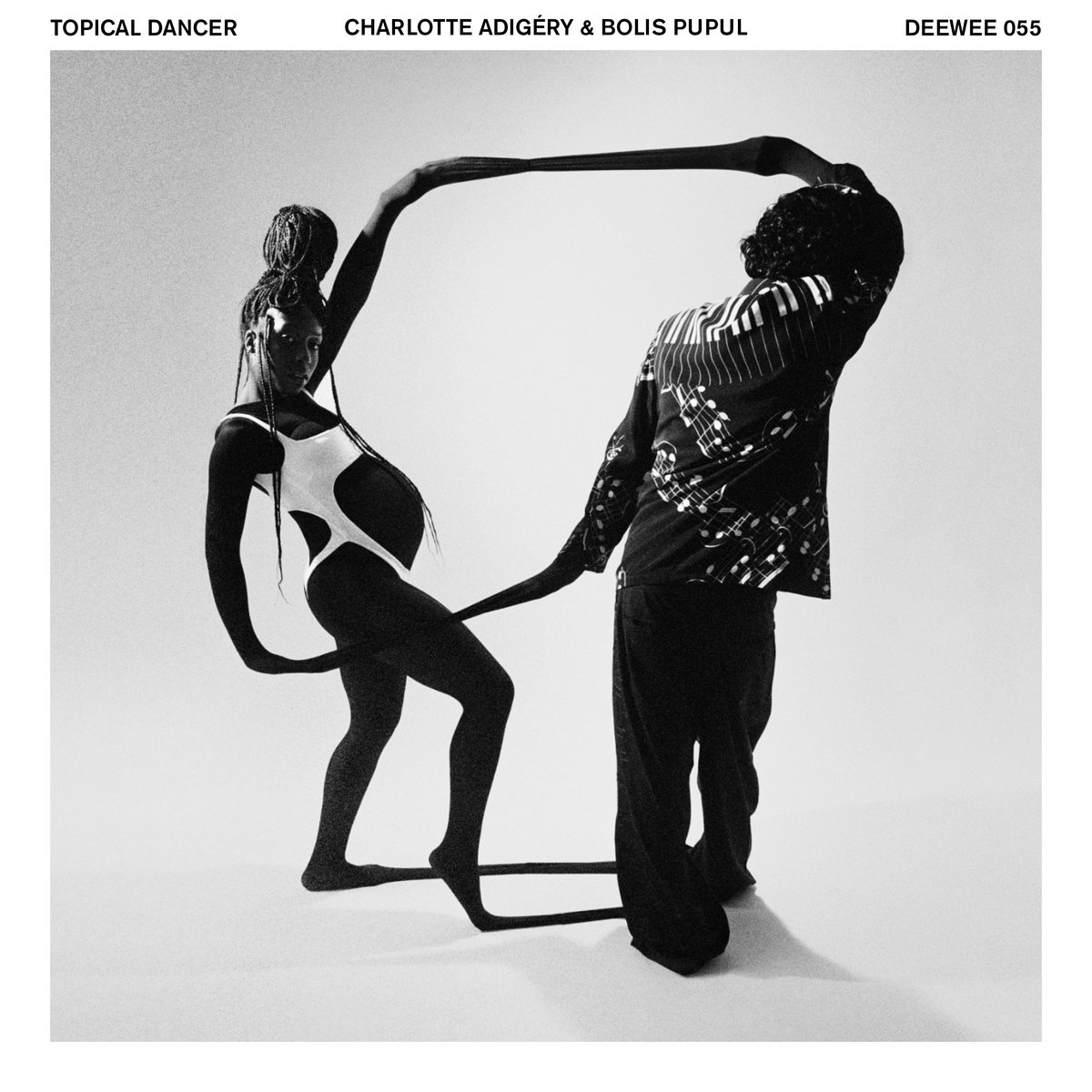
5.
Charlotte Adigéry & Bolis Pupul – Topical Dancer
[DEEWEE]
“Are you polite or political?” Charlotte Adigéry asks on “Esperanto”, implying that one can’t be both. It’s a question she and Bolis Pupul explore on Topical Dancer, their debut album. And tackle they do through 13 songs of inventive electronic music that pulls from the avant garde, R&B, and pop. Take “Esperanto,” which bounces with the levity of a trampoline, or how “Making Sense Stop” carries a slow yet funky 1990s rhythm.
But back to the political—or rather, the personal as political. “Don’t sound what I look like / Don’t look what I sound like / To them,” Adigéry explains on “Blenda”; “It Hit Me” recounts the discovery of the male gaze. These are songs about other people defining who you are. Nevertheless, Adigéry proposes solutions, such as offering alternative phrases for ones deemed outdated or downright offensive on “Esperanto”. Not only does the duo dance over the pitfalls of going political, they build a compelling case for the importance of messaging in music, especially when the stakes involve your own self-worth. Topical Dancer is a guide to defining yourself on your own terms, and doing so with a groove and a shuffle. – Carlo Thomas

4.
Nilüfer Yanya – PAINLESS
[ATO]
Where her debut album, 2019’s Miss Universe, was the sound of an artist finding her voice and channeling the sounds of her youth, PAINLESS is the avenue through which Nilüfer Yanya dissects and refine the music that fueled her aspirations and soundtracked those younger experiences. She has narrowed her focus, and the music here is far more concise and less sprawling than before – which isn’t to say that it’s any less immersive or complicated; it just follows a more polished series of impulses. She still finds ample opportunity to mash genres in odd and beautiful ways, but the spotlight is on how she adapts rather than imitates indie rock and pop of the late 80s and 90s, divining a balance between shiny, memorable melodies and the urge to distort the rhythmic echoes of her memories.
More attuned to specific details and how best to peel back those aspects of our past to make some sense of the present, the record blurs the borders between active wounds and the scars brought on by their existence. Alt-rock theatrics, pop reverberations, and more than its fair share of electronic flourishes are smelted into some alchemic grandeur, resulting in an album both fiercely personal and otherworldly. There are some truly dark moments, though she doesn’t wallow in their darker gravities – by the time we emerge, sweaty and desperately trying to catch our breath, Yanya has laid bard countless tales of hurt and grief and gives us time to process our own trauma considering what we’ve just experienced. – Joshua Pickard

3.
Black Country, New Road – Ants From Up There
[Ninja Tune]
By the time Ants From Up There was released, the band that had recorded it was no more. Singer Isaac Wood had, in the band’s typically sardonic fashion, declared his exit from the spotlight in broken AI language. The album – Black Country, New Road‘s first “real” one after the “dress rehearsal” of For the First Time – chronicles Wood’s fragility head on. Resembling a short novel, it collects a host of symbols surrounding “Concorde”.
This complicated relationship at times addresses the romantic quarrels with an ex-girlfriend, other times seems clear code for Wood’s relationship with fame and success, and the ensuing depression as pressure mounts. This allows for some of the most incredible lyricism this decade has seen so far, communicating emotional upheaval with abstract clarity: “And you, like Concorde / I came, a gentle hill racеr / I was breathless / Up on evеry mountain / Just to look for your light / But for less than a moment / We’d share the same sky / And then Isaac will suffer / Concorde will fly.”
The genius in the album comes with the band’s ability to find immediacy in every element of their art. With its already-iconic cover of a toy airplane in a plastic bag that sits next to Andy Warhol’s Banana in simplistic genius, and dynamic art-rock textures that put Arcade Fire’s later output to shame, it explodes with iconic melancholy and a sense of lost innocence. After all, the toy plane hangs solemnly on a wall, wrapped in plastic like dead Laura Palmer – a banana missing its peel.
This sense of inevitable misery is nowhere more palpable than on the heart wrenching “The Place where he inserted the Blade”. It’s an emotional tour-de-force on the level of intensity that young Conor Oberst managed. Characterizing his subject as “scared of a world where you’re needed” and unable to hold a personal relationship, Wood laments his trauma as a whirlwind of broken bones, Kanye West’s “Bound 2” and chicken-broccoli soup, before diving into the most brilliant of all refrains this year has seen: “Every time I try to make lunch / For anyone else / In my head / I end up dreaming of you / And you come to me / Good morning!”
These moments of ridiculous daily routine and low-brow culture mixed with poignant emotional distress and poetic irony are what sets Ants From Up There apart from its contemporaries. It allows the listener to identify with Wood and see their own struggle and personal heartbreak fuse with its images. Thus, even with a wholly different energy, the album can be read as the Zoomer equivalent to Joy Division’s Closer: a product of its very moment of concept and immediate surrounding, with its key architect leaving the great work of his life behind.
And in that, Ants From Up There became an allegory for 2022. If I was a braver man, I would have expanded on how many of its images resonated with my own sense of isolation and experience with loneliness – but Wood has already done that, inspiring the perspective from each of Concorde’s individual window-seats. From up there, everybody else outside just looks like ants, their problems slowly drifting past, as the airplane disappears into the clouds – going, going, gone. – John Wohlmacher
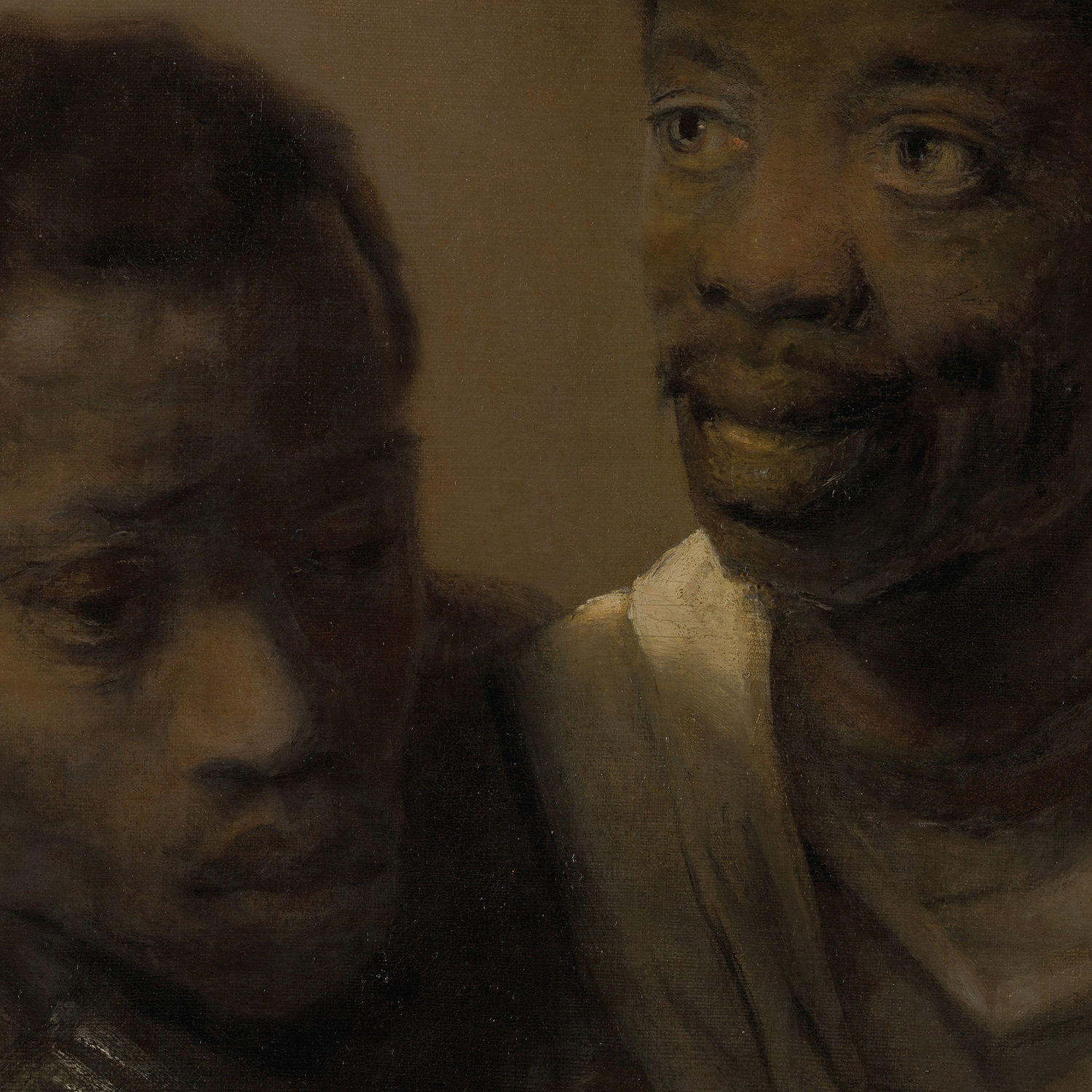
2.
billy woods – Aethiopes
[Backwoodz Studioz]
On Aethiopes, billy woods partners with producer Preservation to craft some of his most seminal work. Opener “Asylum” integrates saloon-ready piano notes, bluesy guitar runs, and accentual beats. woods assumes the role of a boy who lives in a gated residence with his fighting parents, reporting on the activities of a mysterious neighbor. While the narrative is accessible, it’s also fractured, woods employing subtle and unsettling shifts in perspective. When the track ends, the listener feels as if he’s waking from a dream, woods’ images and declarations receding into his unconsciousness.
This tendency to deconstruct narrative is further evident on “The Doldrums”. Sonic elements are minimal and glitchy; the gestalt is lethargic, claustrophobic. “Time ran down on us like the first of the month,” woods offers, evoking tenant-landlord dynamics as much as the stillness of a windless sea, a ravaged neighborhood in a modern city as much as a pre-Enlightenment expedition gone awry. On “Wharves”, meanwhile, woods depicts a shipwrecked crew that resorts to cannibalism to survive. While his lines conjure sublime panoramas, recalling the mammoth canvases of, for example, French Romantic Eugène Delacroix, they also resonate as a critical take on the legacies of slavery and Western capitalism (the album’s cover presents the moving yet colonially problematic “Two Moors” by Rembrandt).
On “Sauvage”, which includes memorable contributions from Boldy James and Gabe ’Nandez, woods offers what is perhaps Aethiopes’ most anecdotally cohesive verse (“Dre shot his uncle for beatin’ his mom”; “Annie used to lock her little brother in his room, and we’d fuck on the couch”; “Apartment complex a speed bump for the stick-ups”). Taken together, woods’ allusions stir a sense of worldly and spiritual bankruptcy. Pres integrates what sound like bells filtered through various effects, thunderous yet short-lived bass notes, and precisely applied splashes of noise.
Throughout Aethiopes, woods moves between concrete and accessible motifs and impeccably crafted fugues, departures that nudge the listener into equally ecstatic and disturbing states. Pres’s soundscapes are less beat-oriented than textural, less structural than ambient. Hyper-complementary, they alternately anchor and etherealize woods’ lyrics. With Aethiopes, woods and Pres address yet ultimately transcend specific and even perennial themes, inspired by the Great Mystery and the Eternal Continuum. – John Amen
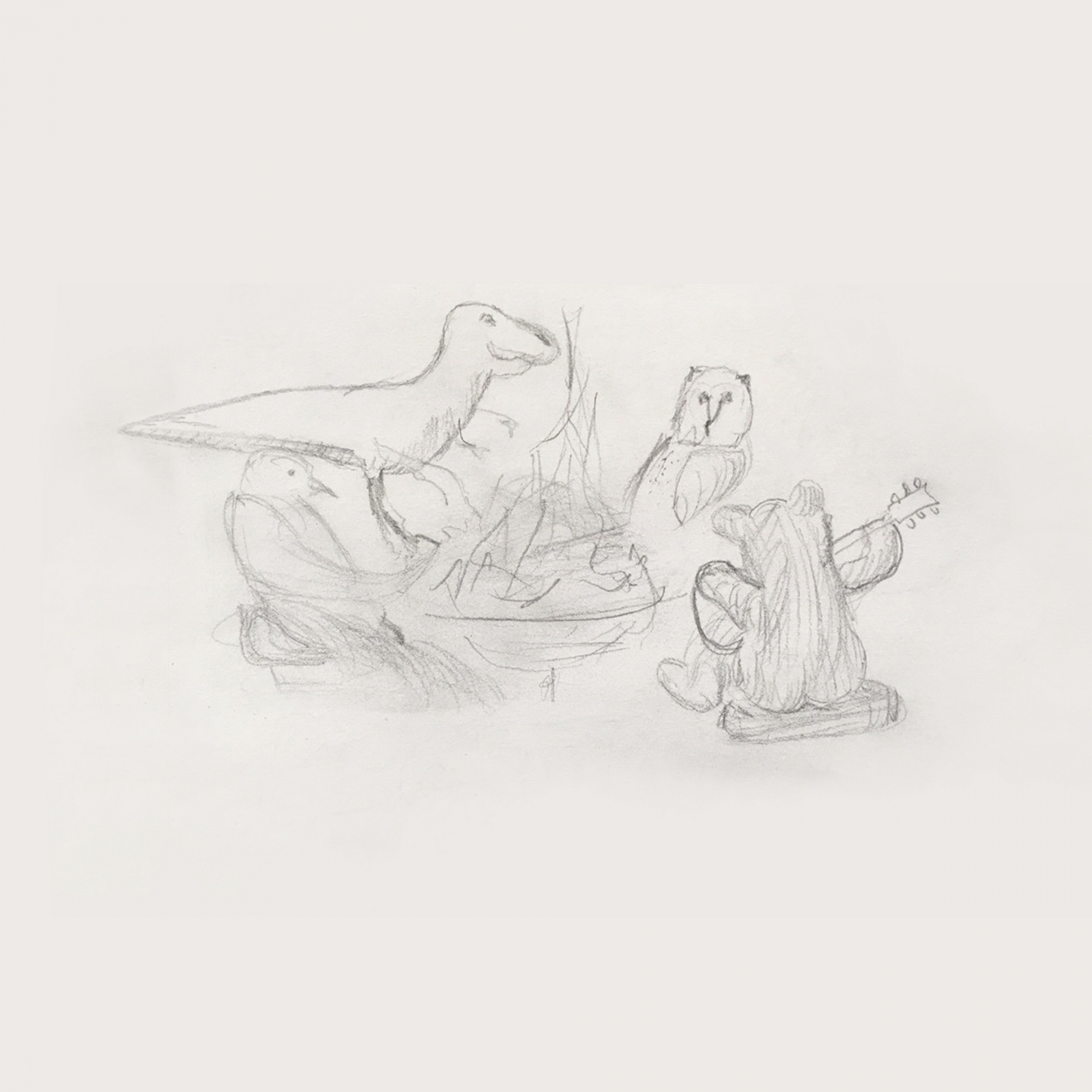
1.
Big Thief – Dragon New Warm Mountain I Believe In You
[4AD]
There’s many reasons you could label Dragon New Warm Mountain I Believe in You as an important record, but perhaps the most striking is that it doesn’t try to be important. Refreshing in a way that lets the music just surround, engulf, and consume you, Big Thief‘s fifth album doesn’t set out to make any grand statement on the world or sneak some hidden agenda past you. Instead, in a simple manner, it’s just a document of an excellent band performing at their peak.
Twenty tracks and 80 minutes long, DNWMIBIY offers a cornucopia of delights, a small catalogue of material to be continually dazzled by. Never exhausting when taken as a whole, but equally open to being consumed in small doses, the album offers new favourites with every spin. It’s impossible not to smile and tap your toe to the jaw harp twang and rustic teetering of the fiddle on the endlessly likeable “Spud Infinity”; to nestle in and listen closely to the delicacy of “Promise Is a Pendulum”; or be invigorated by the ramshackle warble of “Love Love Love”. Pick your fighter; everyone’s an absolute winner.
And at the heart of the album is Adrianne Lenker, an astounding songwriting machine who grasps at life in ways that continue to surprise, amuse, and leave the listener in awe. Her weary requests amidst the chattering drum machines on “Wake Me Up To Drive” are a feeling of not wanting to miss out that is universal to any living soul who has sought to not miss a precious moment of life. But equally when she yelps “That’s my Grandma!” on “Red Moon” there’s something so joyously life-affirming about it – if you say it doesn’t leave a smile on your face afterwards, you’re either a liar or missing a pulse.
And at the end of the album on “Blue Lightning” she declares “I wanna live forever til I die.” You can’t doubt her for a second. Every moment on Dragon New Warm Mountain I Believe in You is a moment of life worth capturing, be it a moment of synergy between each of the band members or a moment of vulnerability as Lenker plays alone to the microphone. This album captures life, and as a consequence it gives the audience life with every listen. – Ray Finlayson
Listen to a Spotify playlist of our highlights from our Top 50 Albums of 2022 here.
Check out our Top 50 Songs of 2022 here.

